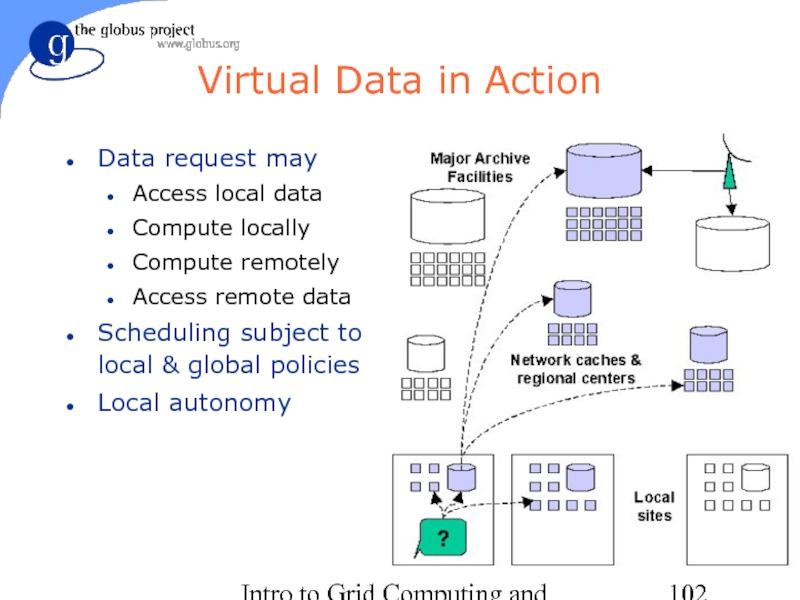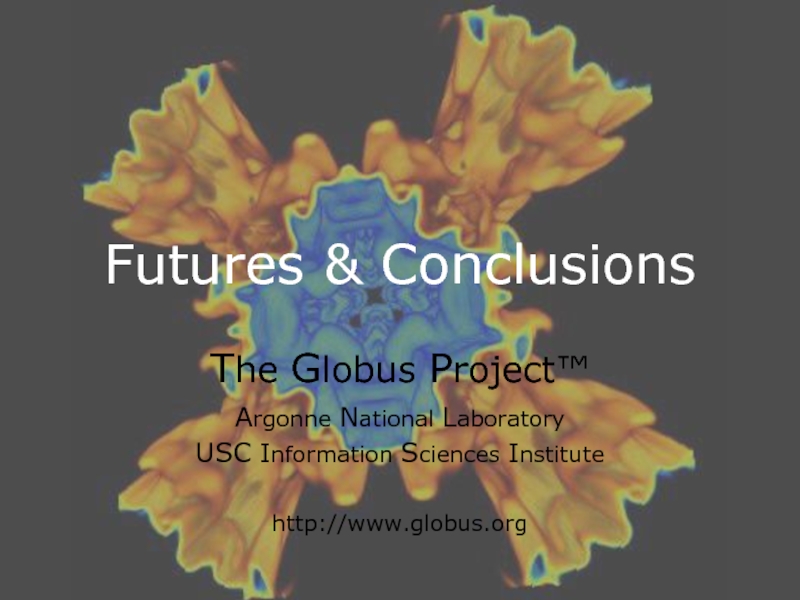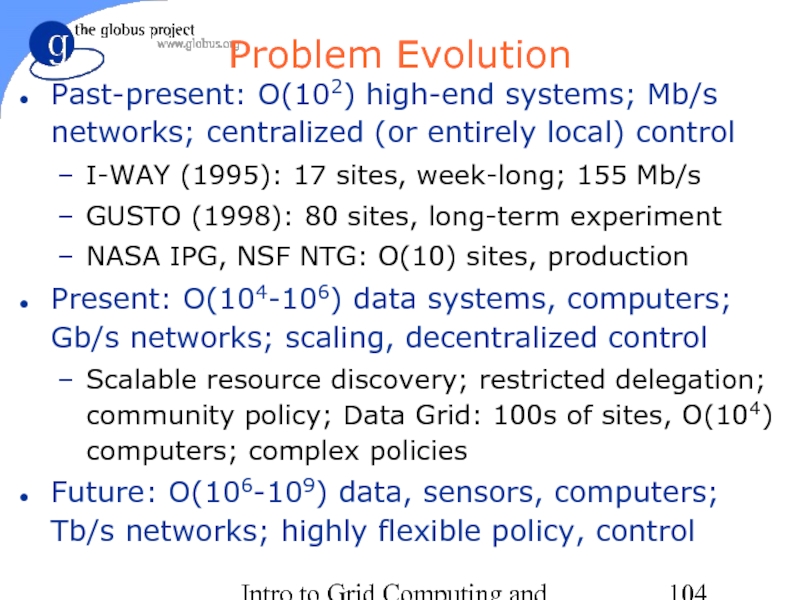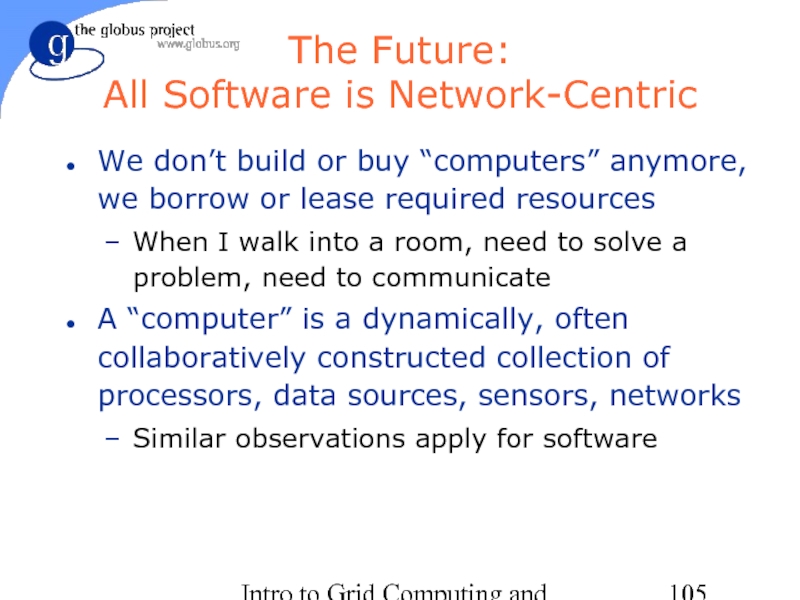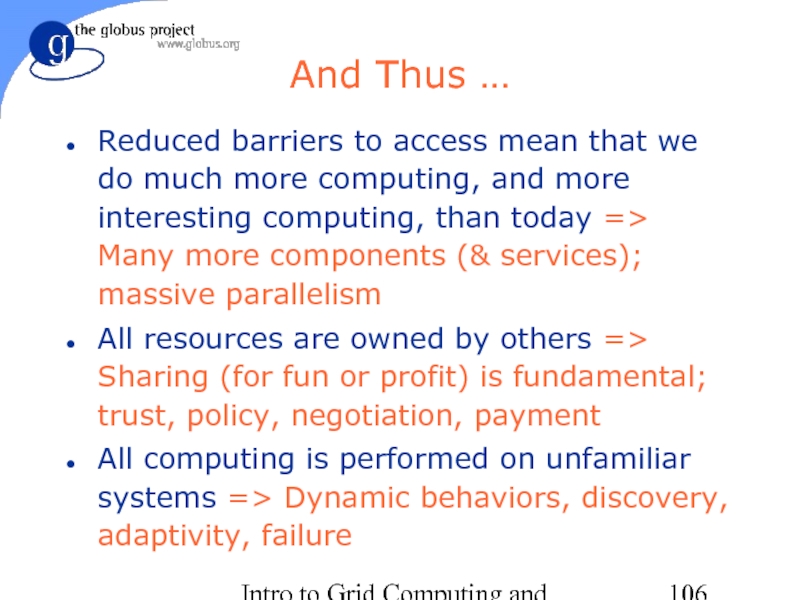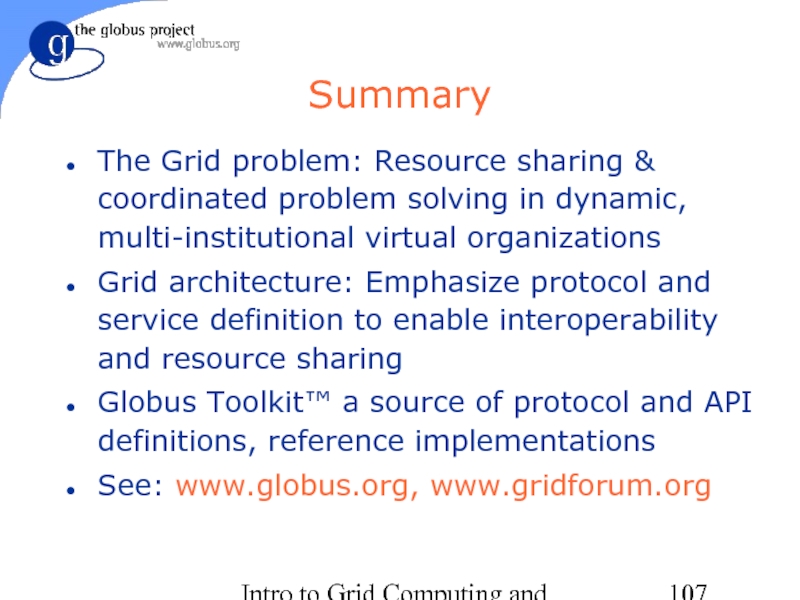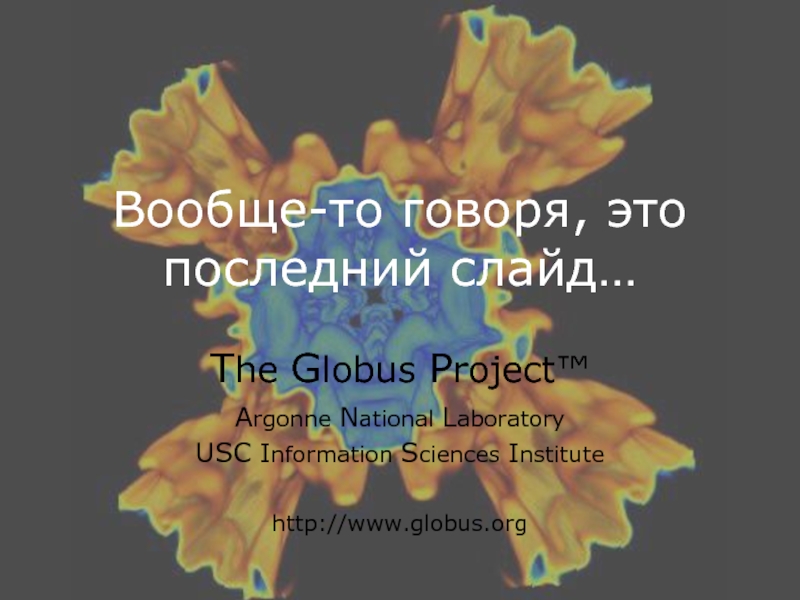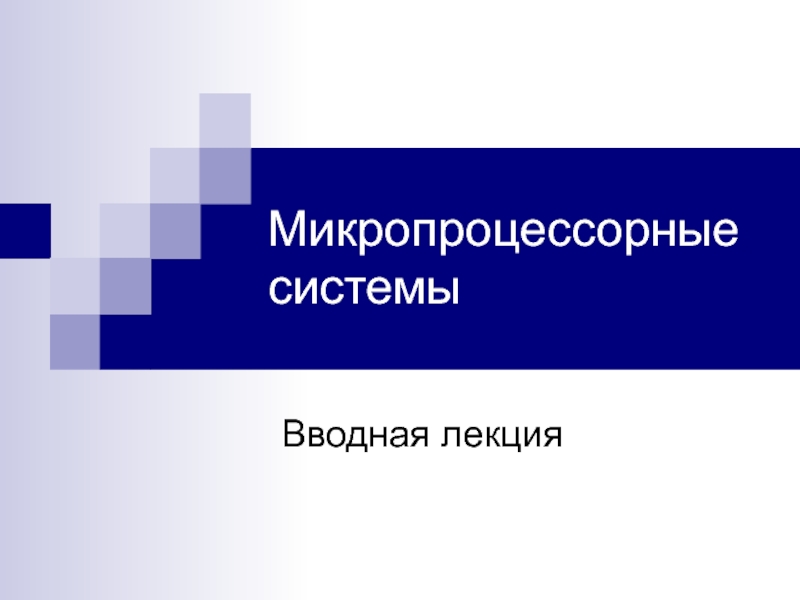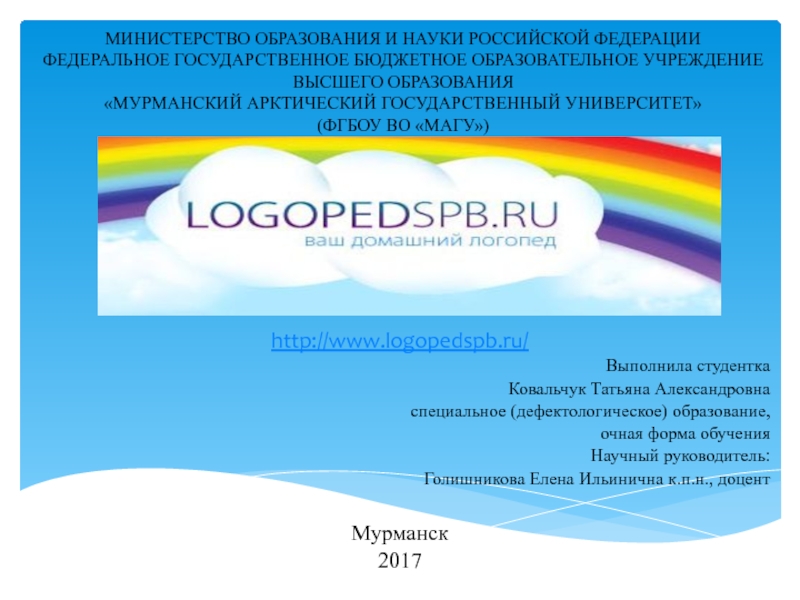- Главная
- Разное
- Дизайн
- Бизнес и предпринимательство
- Аналитика
- Образование
- Развлечения
- Красота и здоровье
- Финансы
- Государство
- Путешествия
- Спорт
- Недвижимость
- Армия
- Графика
- Культурология
- Еда и кулинария
- Лингвистика
- Английский язык
- Астрономия
- Алгебра
- Биология
- География
- Детские презентации
- Информатика
- История
- Литература
- Маркетинг
- Математика
- Медицина
- Менеджмент
- Музыка
- МХК
- Немецкий язык
- ОБЖ
- Обществознание
- Окружающий мир
- Педагогика
- Русский язык
- Технология
- Физика
- Философия
- Химия
- Шаблоны, картинки для презентаций
- Экология
- Экономика
- Юриспруденция
Введение вGrid Computingи Globus Toolkit™ презентация
Содержание
- 1. Введение вGrid Computingи Globus Toolkit™
- 2. Intro to Grid Computing and Globus Toolkit™
- 3. Intro to Grid Computing and Globus Toolkit™
- 4. Intro to Grid Computing and Globus Toolkit™
- 5. Intro to Grid Computing and Globus Toolkit™
- 6. Intro to Grid Computing and Globus Toolkit™
- 7. Intro to Grid Computing and Globus Toolkit™
- 8. Intro to Grid Computing and Globus Toolkit™
- 9. Intro to Grid Computing and Globus Toolkit™
- 10. Intro to Grid Computing and Globus Toolkit™ Некоторые Grid Проекты New New
- 11. Intro to Grid Computing and Globus Toolkit™
- 12. Intro to Grid Computing and Globus Toolkit™ Некоторые Grid Проекты New New
- 13. Intro to Grid Computing and Globus Toolkit™
- 14. Intro to Grid Computing and Globus Toolkit™
- 15. Intro to Grid Computing and Globus Toolkit™
- 16. Intro to Grid Computing and Globus Toolkit™
- 17. Некоторые определения The Globus Project™ Argonne National Laboratory USC Information Sciences Institute http://www.globus.org
- 18. Intro to Grid Computing and Globus Toolkit™
- 19. Intro to Grid Computing and Globus Toolkit™
- 20. Intro to Grid Computing and Globus Toolkit™
- 21. Intro to Grid Computing and Globus Toolkit™
- 22. Intro to Grid Computing and Globus Toolkit™
- 23. Intro to Grid Computing and Globus Toolkit™
- 24. Intro to Grid Computing and Globus Toolkit™
- 25. Intro to Grid Computing and Globus Toolkit™
- 26. Intro to Grid Computing and Globus Toolkit™
- 27. Intro to Grid Computing and Globus Toolkit™
- 28. Архитектура Grid The Globus Project™ Argonne National Laboratory USC Information Sciences Institute http://www.globus.org
- 29. Intro to Grid Computing and Globus Toolkit™
- 30. Intro to Grid Computing and Globus Toolkit™
- 31. Intro to Grid Computing and Globus Toolkit™
- 32. Intro to Grid Computing and Globus Toolkit™
- 33. Intro to Grid Computing and Globus Toolkit™ Многоуровневая Архитектура Grid (По Аналогии с Архитектурой Интернета)
- 34. Intro to Grid Computing and Globus Toolkit™
- 35. Intro to Grid Computing and Globus Toolkit™
- 36. Intro to Grid Computing and Globus Toolkit™
- 37. Intro to Grid Computing and Globus Toolkit™
- 38. Intro to Grid Computing and Globus Toolkit™
- 39. Intro to Grid Computing and Globus Toolkit™
- 40. Intro to Grid Computing and Globus Toolkit™
- 41. Intro to Grid Computing and Globus Toolkit™
- 42. The Programming Problem The Globus Project™ Argonne National Laboratory USC Information Sciences Institute http://www.globus.org
- 43. Intro to Grid Computing and Globus Toolkit™
- 44. Intro to Grid Computing and Globus Toolkit™
- 45. Intro to Grid Computing and Globus Toolkit™
- 46. Intro to Grid Computing and Globus Toolkit™
- 47. Intro to Grid Computing and Globus Toolkit™
- 48. The Globus Toolkit™: Introduction The Globus Project™
- 49. Intro to Grid Computing and Globus Toolkit™
- 50. Intro to Grid Computing and Globus Toolkit™
- 51. Intro to Grid Computing and Globus Toolkit™
- 52. The Globus Toolkit™: Security Services The Globus
- 53. Intro to Grid Computing and Globus Toolkit™
- 54. Intro to Grid Computing and Globus Toolkit™
- 55. Intro to Grid Computing and Globus Toolkit™ Grid Security Requirements
- 56. Intro to Grid Computing and Globus Toolkit™
- 57. Intro to Grid Computing and Globus Toolkit™
- 58. Intro to Grid Computing and Globus Toolkit™
- 59. Intro to Grid Computing and Globus Toolkit™
- 60. Intro to Grid Computing and Globus Toolkit™
- 61. Intro to Grid Computing and Globus Toolkit™
- 62. The Globus Toolkit™: Resource Management Services The
- 63. Intro to Grid Computing and Globus Toolkit™
- 64. Intro to Grid Computing and Globus Toolkit™
- 65. Intro to Grid Computing and Globus Toolkit™
- 66. Intro to Grid Computing and Globus Toolkit™
- 67. Intro to Grid Computing and Globus Toolkit™
- 68. Intro to Grid Computing and Globus Toolkit™
- 69. Intro to Grid Computing and Globus Toolkit™
- 70. Intro to Grid Computing and Globus Toolkit™
- 71. Intro to Grid Computing and Globus Toolkit™
- 72. Intro to Grid Computing and Globus Toolkit™
- 73. Intro to Grid Computing and Globus Toolkit™
- 74. Intro to Grid Computing and Globus Toolkit™
- 75. Intro to Grid Computing and Globus Toolkit™
- 76. The Globus Toolkit™: Information Services The Globus
- 77. Intro to Grid Computing and Globus Toolkit™
- 78. Intro to Grid Computing and Globus Toolkit™
- 79. Intro to Grid Computing and Globus Toolkit™
- 80. Intro to Grid Computing and Globus Toolkit™
- 81. Intro to Grid Computing and Globus Toolkit™
- 82. Intro to Grid Computing and Globus Toolkit™
- 83. Intro to Grid Computing and Globus Toolkit™
- 84. Intro to Grid Computing and Globus Toolkit™
- 85. Intro to Grid Computing and Globus Toolkit™
- 86. Intro to Grid Computing and Globus Toolkit™
- 87. Intro to Grid Computing and Globus Toolkit™
- 88. The Globus Toolkit™: Data Management Services The
- 89. Intro to Grid Computing and Globus Toolkit™
- 90. Intro to Grid Computing and Globus Toolkit™
- 91. Intro to Grid Computing and Globus Toolkit™
- 92. Intro to Grid Computing and Globus Toolkit™
- 93. Intro to Grid Computing and Globus Toolkit™
- 94. Intro to Grid Computing and Globus Toolkit™
- 95. Intro to Grid Computing and Globus Toolkit™
- 96. Intro to Grid Computing and Globus Toolkit™
- 97. Intro to Grid Computing and Globus Toolkit™
- 98. Intro to Grid Computing and Globus Toolkit™
- 99. Intro to Grid Computing and Globus Toolkit™
- 100. Intro to Grid Computing and Globus Toolkit™
- 101. Intro to Grid Computing and Globus Toolkit™
- 102. Intro to Grid Computing and Globus Toolkit™
- 103. Futures & Conclusions The Globus Project™ Argonne National Laboratory USC Information Sciences Institute http://www.globus.org
- 104. Intro to Grid Computing and Globus Toolkit™
- 105. Intro to Grid Computing and Globus Toolkit™
- 106. Intro to Grid Computing and Globus Toolkit™
- 107. Intro to Grid Computing and Globus Toolkit™
- 108. Вообще-то говоря, это последний слайд… The Globus
Слайд 1Введение в
Grid Computing
и Globus Toolkit™
The Globus Project™
Argonne National Laboratory
USC Information Sciences
http://www.globus.org
Слайд 2Intro to Grid Computing and Globus Toolkit™
Содержание
Введение в Grid Computing
Некоторые определения
Архитектура
The Programming Problem
The Globus Toolkit™
Введение, безопасность, управление ресурсами, управление данными
Перспективы
Слайд 3Intro to Grid Computing and Globus Toolkit™
Зачем оно надо?
(The Grid problem)
Flexible,
Из “The Anatomy of the Grid: Enabling Scalable Virtual Organizations”
Дать возможность “виртуальным организациям” совместного использования географически удалённых ресурсов при совместной работе – подразумевая отсутствие…
центрального расположения,
централизованного контроля,
всеведения,
атмосферы доверия.
Слайд 4Intro to Grid Computing and Globus Toolkit™
Составляющие Проблемы
Совместное использование ресурсов
Компьютеры, хранение
Совместное использование ресурсов всегда возможно только при определённых условиях: вопросы доверия, внутренних правил, оплата, переговоры, …
Координированное решение задач
Анализ удалённых данных, вычисления, совместная работа, …
Виртуальные организации - динамичные, включающие различные Институты, группы
Научные сообщества включают различные классические организации
Многочисленные или нет, динамичные или статичные
Слайд 5Intro to Grid Computing and Globus Toolkit™
DOE X-ray grand challenge: ANL,
Томографическая реконструкция
Сбор данных
в режиме
реального времени
wide-area
dissemination
ПК & ВР совместное управление
Advanced Photon Source
Доступ в сети к научным инструментам
архивы
Слайд 6Intro to Grid Computing and Globus Toolkit™
Image courtesy Harvey Newman, Caltech
Grids
Слайд 7Intro to Grid Computing and Globus Toolkit™
Кто =
1000s домашних ПК
Филантропическая компания
Научно-исследовательская компания Scripps
Единая Цель = ускорить исследования в области СПИДа
Домашние компьютеры
тестируют лекарства от СПИДа
Слайд 8Intro to Grid Computing and Globus Toolkit™
Компьютерные сети
Сети vs. Производительность компьютеров
Вычислительные
Скорости сетей удваиваются каждые 9 месяцев
Разница на целый порядок за 5 лет
1986 to 2000
компьютеры: x 500
сети: x 340,000
2001 to 2010
компьютеры: x 60
сети: x 4000
Moore’s Law vs. storage improvements vs. optical improvements. Graph from Scientific American (Jan-2001) by Cleo Vilett, source Vined Khoslan, Kleiner, Caufield and Perkins.
Слайд 9Intro to Grid Computing and Globus Toolkit™
The Globus Project™
Making Grid computing
Тесное сотрудничество с реальными Grid проектами в науке и промышленности
Разработка и распространение стандартных протоколов для Grid с целью достижения совместимости и создания инфраструктуры
Разработка и распространение стандартного программного обеспечения для Grid - универсального и мультиплатформного
The Globus Toolkit™: Бесплатное, в прямом доступе; база для создания различных приложений и создания Grid инфраструктуры
Global Grid Forum: Разработка стандартных протоколов и приложений для Grid
Слайд 13Intro to Grid Computing and Globus Toolkit™
Некоторые Grid Проекты
New
New
Also many technology
See also www.gridforum.org
Слайд 14Intro to Grid Computing and Globus Toolkit™
The 13.6 TF TeraGrid:
Computing at
26
24
8
4
HPSS
5
HPSS
HPSS
UniTree
External Networks
External Networks
External Networks
External Networks
Site Resources
Site Resources
Site Resources
Site Resources
NCSA/PACI
8 TF
240 TB
SDSC
4.1 TF
225 TB
Caltech
Argonne
TeraGrid/DTF: NCSA, SDSC, Caltech, Argonne www.teragrid.org
Слайд 15Intro to Grid Computing and Globus Toolkit™
U.S. PIs: Avery, Foster, Gardner,
iVDGL:
International Virtual Data Grid Laboratory
Слайд 16Intro to Grid Computing and Globus Toolkit™
Для информации
Globus Project™
www.globus.org
Grid Forum
www.gridforum.org
Книга
www.mkp.com/grids
Слайд 17Некоторые определения
The Globus Project™
Argonne National Laboratory
USC Information Sciences Institute
http://www.globus.org
Слайд 18Intro to Grid Computing and Globus Toolkit™
Некоторые важные определения
Ресурс
Протокол сети
Сервис, обеспечиваемый
Интерфейс приложения - Application Programmer Interface (API)
Software Development Kit (SDK)
Синтаксис
Слайд 19Intro to Grid Computing and Globus Toolkit™
Ресурс
Всё, что можно использовать совместно
Компьютеры,
Не обязательно должен быть физической единицей
Condor pool, distributed file system, …
Определяется интерфейсами, а не устройствами
‘планировщик’ (such as LSF and PBS) определяет комьютерный ресурс
Open/close/read/write определяет доступ к распределённой системе файлов , e.g. NFS, AFS, DFS
Слайд 20Intro to Grid Computing and Globus Toolkit™
Сетевой протокол
Формальное описание форматов сообщений
Правила могут определять последовательность обмена сообщениями
Протокол может определять изменение состояния ситемы в конечной точке (например, изменение состояния системы файлов)
Хорошие протоколы созданы с одной целью
Протоколы можно накладывать друг на друга
Примеры Протоколов
IP, TCP, TLS (было SSL), HTTP, Kerberos
Слайд 21Intro to Grid Computing and Globus Toolkit™
Сервис, обеспечиваемый сетью
Создание протокола, который
Протокол определяет связь с сервисом
Все сервисы нуждаются в протоколе
Не все протоколы используются для предоставления сервиса(e.g. IP, TLS)
Примеры: FTP и Web серверы
Слайд 22Intro to Grid Computing and Globus Toolkit™
Application Programming Interface
Набор спецификаций для
Относится к функциональному определению, а не к конкретному воплощению
Например, существует много воплощений MPI
Часто эти спецификации бывают привязаны к конкретному языку программирования
Название программы, количество и тип аргументов, определённые языковые конструкции
Поведение функции или программы
Примеры
GSS API (security), MPI (message passing)
Слайд 23Intro to Grid Computing and Globus Toolkit™
Протокол может иметь множество APIs
TCP/IP
Протокол предоставляет совместимость: программы, использующие разные APIs, могут обмениваться информацией
Мне не нужно знать API другого пользователя
TCP/IP Protocol: Reliable byte streams
WinSock API
Berkeley Sockets API
Application
Application
Слайд 24Intro to Grid Computing and Globus Toolkit™
API может иметь много протоколов
MPI
Но никакой совместимости на уровне SDK
E.g., MPICH и LAM версии MPI
Слайд 25Intro to Grid Computing and Globus Toolkit™
APIs и Протоколы очень важны
Стандартные
Они дают приложению портативность
Но без стандартных протоколов внутренняя совместимость невозможна (любой SDK понимет любой протокол?)
Стандартные протоколы важны
Дают внутреннюю совместимость независимости от месторасположения
Делают возможным совместные инфраструктуры
Но без стандартных APIs/SDKs становится невозможным портативность приложения (различные платформы работают с протоколами по-разному)
Слайд 26Intro to Grid Computing and Globus Toolkit™
Software Development Kit
Определённое воплощение API
SDK
Представляет собой воплощение спецификаций API
Для одного API может быть много SDKs
Примеры SDK
MPICH, Motif Widgets, LAM
Слайд 27Intro to Grid Computing and Globus Toolkit™
Синтаксис
Правила для расшифровки информации
XML, Condor
X.509 certificate format (RFC 2459)
Cryptographic Message Syntax (RFC 2630)
Просьба, не путать с протоколом!
Один и тот же синтаксис может быть использован разными протоколами (e.g., XML)
Синтаксис может быть наложен один на другой
E.g., Condor ClassAds -> XML -> ASCII
Очень важно понимать концепцию наложения синтаксиса при сравнениях и оценке.
Слайд 28Архитектура Grid
The Globus Project™
Argonne National Laboratory
USC Information Sciences Institute
http://www.globus.org
Слайд 29Intro to Grid Computing and Globus Toolkit™
Зачем обсуждать Архитектуру?
Описание
Предлoжить общие термины
Направление работ
Определить основные области, требующие создания сервиса
Предопределение
Определить стандартные “Intergrid”овские протоколы и APIs для создания совместимых и портативных приложений
Слайд 30Intro to Grid Computing and Globus Toolkit™
Некоторые Требования
Идентификация
Авторизация&правила
Поиск ресурсов
Описание ресурсов
Резервирование ресурсов
Распределённые
Доступ к удалённым данным
Высоко-скоростная пересылка данных
Гарантирование производительности
Обнаружение несанкционированного доступа
Распределение ресурсов
Счета и оплата
Обнаружение неполадок
Эволюция систем
Мониторинг
И т.д.
И т.д.
…
Слайд 31Intro to Grid Computing and Globus Toolkit™
Три пункта для превращения “Grid
Новые подходы к решению проблем
Data Grids, распределённые вычисления, peer-to-peer, объединённые grids, …
Структурирование и написание программ
Абстракции, инструменты
Обеспечение совместного доступа к ресурсам
Инспекция ресурсов, доступ, бронирование, выделение; аутентификация, авторизация; коммуникация; Диагностика сбоев; …
Слайд 32Intro to Grid Computing and Globus Toolkit™
В итоге, Grid Архитектура, ориентированная
Создание протоколов и сервисной оболочки Grid
Доступ к удалённым ресурсам через протоколы
Новые сервисы: предоставление ресурсов
“работать в Grid” = понимать Intergrid протоколы
В основном уже имеющиеся протоколы или их расширения
Создание Grid APIs & SDKs
Интерфейсы к Grid протоколам и сервисной оболочке
Помощь в создании приложений путём созданий абстракций на более высоком уровне
Модель , имеющая огромный успех - Internet
Слайд 33Intro to Grid Computing and Globus Toolkit™
Многоуровневая Архитектура Grid (По Аналогии
Слайд 34Intro to Grid Computing and Globus Toolkit™
Протоколы, Сервис и APIs находятся
Язык/Frameworks
Fabric Layer
Приложение
Протоколы и APIs локального доступа
APIs and SDKs общего сервиса
Общий сервис
Протоколы общего сервиса
APIs and SDKs ресурсов
Сервис ресурсов
Протоколы сервиса ресурсов
APIs связи
Протоколы связи
Слайд 35Intro to Grid Computing and Globus Toolkit™
Важные моменты:
Основано на протоколах и
Связь, маршруты, определение имени, и т.д.
“Многоуровневость” здесь чисто концептуальна, НЕ накладывает никаких ограничений на то, кто какие функции может вызвать
Протоколы/сервис/APIs/SDKs в идеале, будут самодостаточны
Некоторые вещи здесь фундаментальны: например, коммуникация и защищённость
Привлекательно для функций высокого уровня использовать стандартные функции низкого уровня
Слайд 36Intro to Grid Computing and Globus Toolkit™
Ну и что сейчас с
Не существует никаких ‘официальных’ стандартов
НО:
Globus Toolkit™ является практически de facto стандартом для многих важных протоколов (связь, ресурсы и общие)
GGF имеет рабочую группу по архитектуре
Технические детали находятся сейчас в разработке: защищённость, управление ресурсами и данными, информационный сервис
Документы (в области безопасности) приняты к публикации в Интернете
Слайд 37Intro to Grid Computing and Globus Toolkit™
‘Fabric’ уровень
Протоколы и сервис
Всё что
ПК, файловые системы, архивы, каталоги метаданных, сети, сенсоры и т.д, и т.п.
Несколько ограничений на технологии низких уровней (Few constraints on low-level technology): протоколы связи и ресурсов являются узким местом
Определяется интерфейсами, а не физическими характеристиками
Слайд 38Intro to Grid Computing and Globus Toolkit™
GSI: www.gridforum.org/security/gsi
Уровень связи:
Протоколы & Сервис
Коммуникация
Internet
Защищённость: Grid Security Infrastructure (GSI)
Единая идентификация, авторизация и защищённая передача сообщений
Однократный логин, делегирование, идентификация
Public key technology, SSL, X.509, GSS-API
Инфраструктура поддержки: централизованная выдача сертификатов, управление сертификатами и ключами, …
Слайд 39Intro to Grid Computing and Globus Toolkit™
GRAM, GridFTP, GRIS: www.globus.org
Уровень ресурсов:
Grid Resource Allocation Management (GRAM)
Удалённые ресурсы : выделение, резервирование, мониторинг и управление компьютерными ресурсами
GridFTP протокол (FTP расширения)
Высокоскоростной доступ к данным и пересылка
Grid Resource Information Service (GRIS)
Доступ к информации
В проекте: доступ к каталогам, доступ к библиотеке програм, Catalog access, code repository access, и т.д.
Всё пострено на уровне: GSI & IP
Слайд 40Intro to Grid Computing and Globus Toolkit™
Общий Уровень:
Протоколы & Сервис
Распределение ресурсов
Поиск и выявление ресурсов
Каталог реплик
Сервис копирования
Сервис по одновременному резервированию и выделению
И т.д.
Condor: www.cs.wisc.edu/condor
Слайд 41Intro to Grid Computing and Globus Toolkit™
Пример:
Data Grid Архитектура
Приложение, специфичное для
Выбор реплики, управление заданием, виртуальный каталог данных, …
Каталог реплик, управление репликами, выделение ресурсов, выдача сертификатов, каталоги метаданных
Доступ к данным, доступ к компьютерам, доступ к информации о сети,..
Коммуникации, поиск сервиса (DNS), идентификация, авторизация, делегация
Системы хранения данных, кластеры, сети, ...
Collective
(App)
App
Collective
(Generic)
Resource
Connect
Fabric
Слайд 42The Programming Problem
The Globus Project™
Argonne National Laboratory
USC Information Sciences Institute
http://www.globus.org
Слайд 43Intro to Grid Computing and Globus Toolkit™
The Programming Problem
But how do
I need, presumably:
Abstractions and models to add to speed/robustness/etc. of development
Tools to ease application development and diagnose common problems
Code/tool sharing to allow reuse of code components developed by others
Слайд 44Intro to Grid Computing and Globus Toolkit™
Проблема программирования
Ну и как мне
Для этого мне нужно:
Абстракции и модели чтобы ускорить/улучшить сам процесс
Набор программных средств для диагностики проблем и упрощения написания программы
Создать универсальные средства, чтобы было возможно использование некоторых компонент другими
Слайд 45Intro to Grid Computing and Globus Toolkit™
Examples of Grid
Programming Technologies
MPICH-G2: Grid-enabled
CoG Kits, GridPort: Portal construction, based on N-tier architectures
GDMP, Data Grid Tools, SRB: replica management, collection management
Condor-G: workflow management
Legion: object models for Grid computing
Cactus: Grid-aware numerical solver framework
Note tremendous variety, application focus
Слайд 46Intro to Grid Computing and Globus Toolkit™
Примеры Программных Технологий в Grid
MPICH-G2:
CoG Kits, GridPort: идея портала, основано на N-уровневой архитектуре
GDMP, Data Grid Tools, SRB: управление репликами, набором данных
Condor-G: управление процессом расчётов
Legion: объектные модели для программирования в Grid
Cactus: адаптированные для Grid набор средств для решения численных задач
Следует обратить внимание на огромное разнообразие средств (все ориентированны на определённое приложение)
Слайд 47Intro to Grid Computing and Globus Toolkit™
За всем этим стоит единый
Ни один из перечисленных проектов не создавал протоколы и пр. с нуля!
Использовался единый набор средств, который…
Имеет все основные функции
SDKs который может быть использован для создания различных программных продуктов
Стандартный сервис, который легко установить
Надёжный, правильно спроектированный, не противоречащий себе
Является бесплатным, широко доступным
Всем этим требованиям отвечает Globus Toolkit™…
Слайд 48The Globus Toolkit™:
Introduction
The Globus Project™
Argonne National Laboratory
USC Information Sciences Institute
http://www.globus.org
Слайд 49Intro to Grid Computing and Globus Toolkit™
Globus Toolkit™
Набор программных средств, решающий
Предлагает ‘пакетный’ набор средств
Позволяет поэтапное создание программных средств и приложений для Grid
Воплощает стандартные Grid протоколы и APIs
Доступен бесплатно для всех (Оpen source)
Слайд 50Intro to Grid Computing and Globus Toolkit™
Общий подход
Определить Grid протоколы &
Доступ к удалённым ресурсам посредством протоколов
Интегрировать и расширить имеющиеся стандарты
Создать соответствующий набор средств
Доступный всем Globus Toolkit
Набор утилит, SDKs, сервис, и т.д.
Адаптировать для Grid множество известных приложений
Globus Toolkit, FTP, SSH, Condor, SRB, MPI, …
Учиться на своём опыте
(Эти тезисы взяты с официального сайта…)
Слайд 51Intro to Grid Computing and Globus Toolkit™
Четыре ключевых протокола
The Globus Toolkit™
Уровень связи:
защищённость: Grid Security Infrastructure (GSI)
Уровень ресурсов:
Управление ресурсами: Grid Resource Allocation Management (GRAM)
Информационный сервис: Grid Resource Information Protocol (GRIP)
Пересылка данных: Grid File Transfer Protocol (GridFTP)
Также основные протоколы ‘общего’ уровня
Информационный сервис, управление репликами, и т.д.
Слайд 52The Globus Toolkit™:
Security Services
The Globus Project™
Argonne National Laboratory
USC Information Sciences Institute
http://www.globus.org
Слайд 53Intro to Grid Computing and Globus Toolkit™
Проблемы при реализации Grid Security…
Resources
Resources are often located in distinct administrative domains
Each resource has own policies & procedures
Set of resources used by a single computation may be large, dynamic, and unpredictable
Not just client/server, requires delegation
It must be broadly available & applicable
Standard, well-tested, well-understood protocols; integrated with wide variety of tools
Слайд 54Intro to Grid Computing and Globus Toolkit™
Site A
(Kerberos)
(Unix)
Site C
(Kerberos)
Computer
User
Computer
Storage
system
GSI in Action
“Create Processes at A and B
that Communicate & Access Files at C”
Слайд 56Intro to Grid Computing and Globus Toolkit™
X.509 Proxy Certificate
Defines how a
A “proxy certificate” is a special type of X.509 certificate that is signed by the normal end entity cert, or by another proxy
Supports single sign-on & delegation through “impersonation”
Currently an IETF draft
Слайд 57Intro to Grid Computing and Globus Toolkit™
Globus Security APIs
Generic Security Service
IETF standard
Provides functions for authentication, delegation, message protection
Decoupled from any particular communication method
But GSS-API is somewhat complicated, so we also provide the easier-to-use globus_gss_assist API.
GSI-enabled SASL is also provided
Слайд 58Intro to Grid Computing and Globus Toolkit™
Results
GSI adopted by 100s of
Globus CA has issued >3000 certs (user & host), >1500 currently active; other CAs active
Rollouts are currently underway all over:
NSF Teragrid, NASA Information Power Grid, DOE Science Grid, European Data Grid, etc.
Integrated in research & commercial apps
GrADS testbed, Earth Systems Grid, European Data Grid, GriPhyN, NEESgrid, etc.
Standardization begun in Global Grid Forum, IETF
Слайд 59Intro to Grid Computing and Globus Toolkit™
GSI Applications
Globus Toolkit™ uses GSI
Many Grid tools, directly or indirectly, e.g.
Condor-G, SRB, MPICH-G2, Cactus, GDMP, …
Commercial and open source tools, e.g.
ssh, ftp, cvs, OpenLDAP, OpenAFS
SecureCRT (Win32 ssh client)
And since we use standard X.509 certificates, they can also be used for
Web access, LDAP server access, etc.
Слайд 60Intro to Grid Computing and Globus Toolkit™
Ongoing and Future GSI Work
Protection
Restricted delegation, smartcards
Standardization
Scalability in numbers of users & resources
Credential management
Online credential repositories (“MyProxy”)
Account management
Authorization
Policy languages
Community authorization
Слайд 61Intro to Grid Computing and Globus Toolkit™
Security Summary
GSI successfully addresses wide
Broad acceptance, deployment, integration with tools
Standardization on-going in IETF & GGF
Ongoing R&D to address next set of issues
For more information:
www.globus.org/research/papers.html
“A Security Architecture for Computational Grids”
“Design and Deployment of a National-Scale Authentication Infrastructure”
www.gridforum.org/security
Слайд 62The Globus Toolkit™:
Resource Management Services
The Globus Project™
Argonne National Laboratory
USC Information Sciences
http://www.globus.org
Слайд 63Intro to Grid Computing and Globus Toolkit™
The Challenge
Enabling secure, controlled remote
Authentication and authorization
Resource discovery & characterization
Reservation and allocation
Computation monitoring and control
Addressed by new protocols & services
GRAM protocol as a basic building block
Resource brokering & co-allocation services
GSI for security, MDS for discovery
Слайд 64Intro to Grid Computing and Globus Toolkit™
Resource Management
The Grid Resource Allocation
Resource Specification Language (RSL) is used to communicate requirements
A layered architecture allows application-specific resource brokers and co-allocators to be defined in terms of GRAM services
Integrated with Condor, PBS, MPICH-G2, …
Слайд 65Intro to Grid Computing and Globus Toolkit™
GRAM Protocol
GRAM-1: Simple HTTP-based RPC
Job
Returns a “job contact”: Opaque string that can be passed between clients, for access to job
Job cancel, status, signal
Event notification (callbacks) for state changes
Pending, active, done, failed, suspended
GRAM-1.5 (U Wisconsin contribution)
Add reliability improvements
Once-and-only-once submission
Recoverable job manager service
Reliable termination detection
GRAM-2: Moving to Web Services (SOAP)…
Слайд 66Intro to Grid Computing and Globus Toolkit™
GRAM
GRAM
GRAM
LSF
Condor
NQE
Application
RSL
Simple ground RSL
Information Service
Local
resource
managers
RSL
specialization
Ground RSL
Queries
&
Resource
Management Architecture
Слайд 67Intro to Grid Computing and Globus Toolkit™
Resource Specification Language
Common notation for
Syntax similar to MDS/LDAP filters
RSL provides two types of information:
Resource requirements: Machine type, number of nodes, memory, etc.
Job configuration: Directory, executable, args, environment
Globus Toolkit provides an API/SDK for manipulating RSL
Слайд 68Intro to Grid Computing and Globus Toolkit™
RSL Syntax
Elementary form: parenthesis clauses
(attribute
Operators Supported:
<, <=, =, >=, > , !=
Some supported attributes:
executable, arguments, environment, stdin, stdout, stderr, resourceManagerContact, resourceManagerName
Unknown attributes are passed through
May be handled by subsequent tools
Слайд 69Intro to Grid Computing and Globus Toolkit™
Constraints: “&”
For example:
& (count>=5) (count
(executable=myprog)
“Create 5-10 instances of myprog, each on a machine with at least 64 MB memory that is available to me for 4 hours”
Слайд 70Intro to Grid Computing and Globus Toolkit™
Disjunction: “|”
For example:
& (executable=myprog)
(&(count=10)(memory>=32)))
Create 5 instances of myprog on a machine that has at least 64MB of memory, or 10 instances on a machine with at least 32MB of memory
Слайд 71Intro to Grid Computing and Globus Toolkit™
Globus Toolkit Implementation
Gatekeeper
Single point of
Authenticates user, maps to local security environment, runs service
In essence, a “secure inetd”
Job manager
A gatekeeper service
Layers on top of local resource management system (e.g., PBS, LSF, etc.)
Handles remote interaction with the job
Слайд 72Intro to Grid Computing and Globus Toolkit™
GRAM Components
Grid Security
Infrastructure
Job Manager
GRAM client
request resource allocation
and process creation.
MDS client API calls
to locate resources
Query current status
of resource
Create
RSL Library
Parse
Request
Allocate &
create processes
Process
Process
Process
Monitor &
control
Site boundary
Client
MDS: Grid Index Info Server
Gatekeeper
MDS: Grid Resource Info Server
Local Resource Manager
MDS client API calls
to get resource info
GRAM client API state
change callbacks
Слайд 73Intro to Grid Computing and Globus Toolkit™
Co-allocation
Simultaneous allocation of a resource
Handled via optimistic co-allocation based on free nodes or queue prediction
In the future, advance reservations will also be supported (already in prototype)
Globus APIs/SDKs support the co-allocation of specific multi-requests
Uses a Globus component called the Dynamically Updated Request Online Co-allocator (DUROC)
Слайд 74Intro to Grid Computing and Globus Toolkit™
Multirequest: “+”
A multirequest allows us
+ (& (count=5)(memory>=64)
(executable=p1))
(&(network=atm) (executable=p2))
Execute 5 instances of p1 on a machine with at least 64M of memory
Execute p2 on a machine with an ATM connection
Multirequests are central to co-allocation
Слайд 75Intro to Grid Computing and Globus Toolkit™
A Co-allocation Multirequest
+( & (resourceManagerContact=
(count=1)
(label="subjob A")
(executable= my_app1)
)
( & (resourceManagerContact=
“sp139.sdsc.edu:8711:/C=US/…/CN=sp097.sdsc.edu-lsf")
(count=2)
(label="subjob B")
(executable=my_app2)
)
Слайд 76The Globus Toolkit™:
Information Services
The Globus Project™
Argonne National Laboratory
USC Information Sciences Institute
http://www.globus.org
Слайд 77Intro to Grid Computing and Globus Toolkit™
Grid Information Services
System information is
What resources are available?
Resource discovery
What is the “state” of the grid?
Resource selection
How to optimize resource use
Application configuration and adaptation?
We need a general information infrastructure to answer these questions
Слайд 78Intro to Grid Computing and Globus Toolkit™
Examples of Useful Information
Characteristics of
IP address, software available, system administrator, networks connected to, OS version, load
Characteristics of a network
Bandwidth and latency, protocols, logical topology
Characteristics of the Globus infrastructure
Hosts, resource managers
Слайд 79Intro to Grid Computing and Globus Toolkit™
Grid Information: Facts of Life
Information
Time of flight, changing system state
Need to provide quality metrics
Distributed state hard to obtain
Complexity of global snapshot
Component will fail
Scalability and overhead
Many different usage scenarios
Heterogeneous policy, different information organizations, etc.
Слайд 80Intro to Grid Computing and Globus Toolkit™
Grid Information Service
Provide access to
A basis for configuration and adaptation in heterogeneous, dynamic environments
Requirements and characteristics
Uniform, flexible access to information
Scalable, efficient access to dynamic data
Access to multiple information sources
Decentralized maintenance
Слайд 81Intro to Grid Computing and Globus Toolkit™
The GIS Problem: Many Information
R
R
R
R
R
R
R
R
R
R
R
R
R
R
R
R
R
Слайд 82Intro to Grid Computing and Globus Toolkit™
Information Protocols
Grid Resource Registration Protocol
Support
Designed to support machine/network failure
Grid Resource Inquiry Protocol
Query resource description server for information
Query aggregate server for information
LDAP V3.0 in Globus 1.1.3
Слайд 83Intro to Grid Computing and Globus Toolkit™
GIS Architecture
A
A
Customized Aggregate Directories
R
R
R
R
Standard
Registration
Protocol
Users
Enquiry
Protocol
Слайд 84Intro to Grid Computing and Globus Toolkit™
Metacomputing Directory Service
Use LDAP as
Access information in a distributed directory
Directory represented by collection of LDAP servers
Each server optimized for particular function
Directory can be updated by:
Information providers and tools
Applications (i.e., users)
Backend tools which generate info on demand
Information dynamically available to tools and applications
Слайд 85Intro to Grid Computing and Globus Toolkit™
LDAP Details
Lightweight Directory Access Protocol
IETF
Stripped down version of X.500 DAP protocol
Supports distributed storage/access (referrals)
Supports authentication and access control
Defines:
Network protocol for accessing directory contents
Information model defining form of information
Namespace defining how information is referenced and organized
Слайд 86Intro to Grid Computing and Globus Toolkit™
Information Services API
RFC 1823 defines
Connect to server
Pose query which returns data structures contains sets of object classes and attributes
Functions to walk these data structures
Globus does not provide an LDAP API. We recommend the use of OpenLDAP, an open source implementation of RFC 1823.
Слайд 87Intro to Grid Computing and Globus Toolkit™
Searching an LDAP Directory
grid-info-search [options]
Default grid-info-search options
-h mds.globus.org MDS server
-p 389 MDS port
-b “o=Grid” search start point
-T 30 LDAP query timeout
-s sub scope = subtree alternatives:
base : lookup this entry
one : lookup immediate children
Слайд 88The Globus Toolkit™:
Data Management Services
The Globus Project™
Argonne National Laboratory
USC Information Sciences
http://www.globus.org
Слайд 89Intro to Grid Computing and Globus Toolkit™
Data Grid Problem
“Enable a geographically
Note that this problem:
Is common to many areas of science
Overlaps strongly with other Grid problems
Слайд 90Intro to Grid Computing and Globus Toolkit™
Major Data Grid Projects
Earth System
DG technologies, climate applications
European Data Grid (EU)
DG technologies & deployment in EU
GriPhyN (NSF ITR)
Investigation of “Virtual Data” concept
Particle Physics Data Grid (DOE Science)
DG applications for HENP experiments
Слайд 91Intro to Grid Computing and Globus Toolkit™
Data Intensive Issues Include …
Harness
Respect local and global policies governing what can be used for what
Schedule resources efficiently, again subject to local and global constraints
Achieve high performance, with respect to both speed and reliability
Catalog software and virtual data
Слайд 92Intro to Grid Computing and Globus Toolkit™
Data Intensive
Computing and Grids
The term
Unfortunate as it implies a distinct infrastructure, which it isn’t; but easy to say
Data-intensive computing shares numerous requirements with collaboration, instrumentation, computation, …
Security, resource mgt, info services, etc.
Important to exploit commonalities as very unlikely that multiple infrastructures can be maintained
Fortunately this seems easy to do!
Слайд 93Intro to Grid Computing and Globus Toolkit™
A Model Architecture for Data
Metadata Catalog
Replica Catalog
Tape Library
Disk Cache
Attribute Specification
Logical Collection and Logical File Name
Disk Array
Disk Cache
Application
Replica
Selection
Multiple Locations
NWS
Selected
Replica
GridFTP Control Channel
Performance
Information &
Predictions
Replica Location 1
Replica Location 2
Replica Location 3
MDS
GridFTP
Data
Channel
Слайд 94Intro to Grid Computing and Globus Toolkit™
Globus Toolkit Components
Two major Data
1. Data Transport and Access
Common protocol
Secure, efficient, flexible, extensible data movement
Family of tools supporting this protocol
2. Replica Management Architecture
Simple scheme for managing:
multiple copies of files
collections of files
Слайд 95Intro to Grid Computing and Globus Toolkit™
Access/Transport Protocol Requirements
Suite of communication
GSI, Kerberos security
Third-party transfers
Parameter set/negotiate
Partial file access
Reliability/restart
Large file support
Data channel reuse
All based on a standard, widely deployed protocol
Integrated instrumentation
Loggin/audit trail
Parallel transfers
Striping (cf DPSS)
Policy-based access control
Server-side computation
Proxies (firewall, load bal)
Слайд 96Intro to Grid Computing and Globus Toolkit™
And The Protocol Is …
Why FTP?
Ubiquity enables interoperation with many commodity tools
Already supports many desired features, easily extended to support others
Well understood and supported
We use the term GridFTP to refer to
Transfer protocol which meets requirements
Family of tools which implement the protocol
Note GridFTP > FTP
Note that despite name, GridFTP is not restricted to file transfer!
Слайд 97Intro to Grid Computing and Globus Toolkit™
GridFTP: Basic Approach
FTP protocol is
Start with most commonly used subset
Standard FTP: get/put etc., 3rd-party transfer
Implement standard but often unused features
GSS binding, extended directory listing, simple restart
Extend in various ways, while preserving interoperability with existing servers
Striped/parallel data channels, partial file, automatic & manual TCP buffer setting, progress monitoring, extended restart
Слайд 98Intro to Grid Computing and Globus Toolkit™
GridFTP Protocol Specifications
Existing standards
RFC 949:
RFC 2228: FTP Security Extensions
RFC 2389: Feature Negotiation for the File Transfer Protocol
Draft: FTP Extensions
New drafts
GridFTP: Protocol Extensions to FTP for the Grid
Grid Forum Data Working Group
Слайд 99Intro to Grid Computing and Globus Toolkit™
A Word on GASS
The Globus
GASS uses GSI-enabled HTTP as the protocol for data transfer, and a caching algorithm for copying data when necessary.
The globus_gass, globus_gass_transfer, and globus_gass_cache APIs provide programmer access to these capabilities, which are already integrated with the GRAM job submission tools.
Слайд 100Intro to Grid Computing and Globus Toolkit™
Grid Physics Network (GriPhyN)
Enabling
ATLAS
CMS
LIGO
SDSS
Слайд 101Intro to Grid Computing and Globus Toolkit™
The Virtual Data Concept
“[a
Слайд 102Intro to Grid Computing and Globus Toolkit™
Virtual Data in Action
Data request
Access local data
Compute locally
Compute remotely
Access remote data
Scheduling subject to local & global policies
Local autonomy
Слайд 103Futures & Conclusions
The Globus Project™
Argonne National Laboratory
USC Information Sciences Institute
http://www.globus.org
Слайд 104Intro to Grid Computing and Globus Toolkit™
Problem Evolution
Past-present: O(102) high-end
I-WAY (1995): 17 sites, week-long; 155 Mb/s
GUSTO (1998): 80 sites, long-term experiment
NASA IPG, NSF NTG: O(10) sites, production
Present: O(104-106) data systems, computers; Gb/s networks; scaling, decentralized control
Scalable resource discovery; restricted delegation; community policy; Data Grid: 100s of sites, O(104) computers; complex policies
Future: O(106-109) data, sensors, computers; Tb/s networks; highly flexible policy, control
Слайд 105Intro to Grid Computing and Globus Toolkit™
The Future:
All Software is Network-Centric
We
When I walk into a room, need to solve a problem, need to communicate
A “computer” is a dynamically, often collaboratively constructed collection of processors, data sources, sensors, networks
Similar observations apply for software
Слайд 106Intro to Grid Computing and Globus Toolkit™
And Thus …
Reduced barriers to
All resources are owned by others => Sharing (for fun or profit) is fundamental; trust, policy, negotiation, payment
All computing is performed on unfamiliar systems => Dynamic behaviors, discovery, adaptivity, failure
Слайд 107Intro to Grid Computing and Globus Toolkit™
Summary
The Grid problem: Resource sharing
Grid architecture: Emphasize protocol and service definition to enable interoperability and resource sharing
Globus Toolkit™ a source of protocol and API definitions, reference implementations
See: www.globus.org, www.gridforum.org
Слайд 108Вообще-то говоря, это последний слайд…
The Globus Project™
Argonne National Laboratory
USC Information Sciences
http://www.globus.org

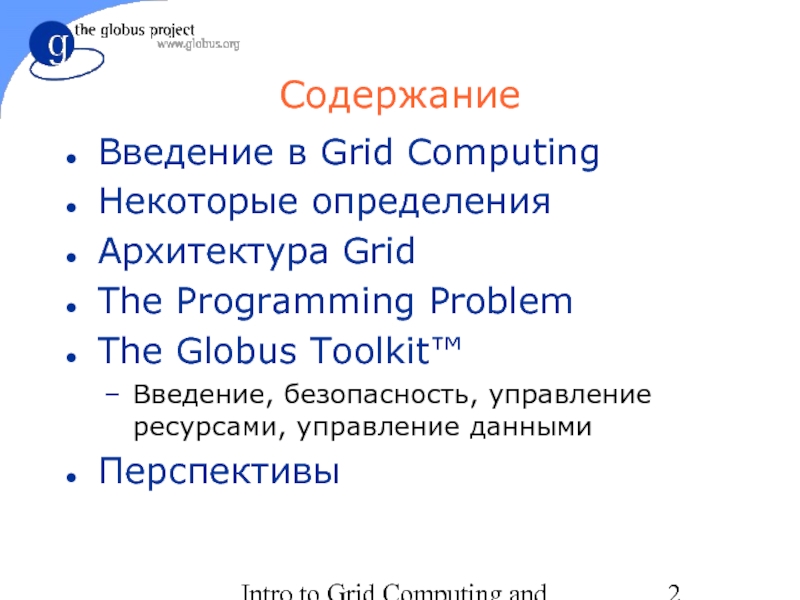
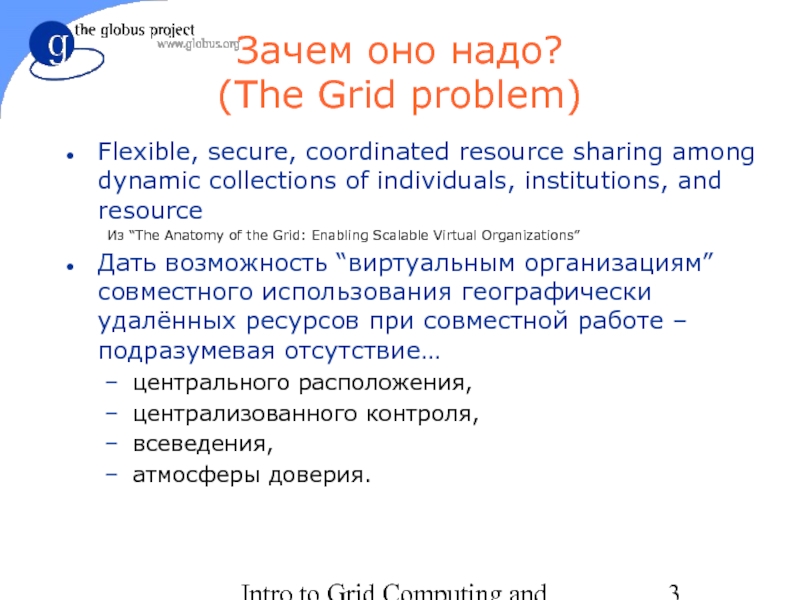
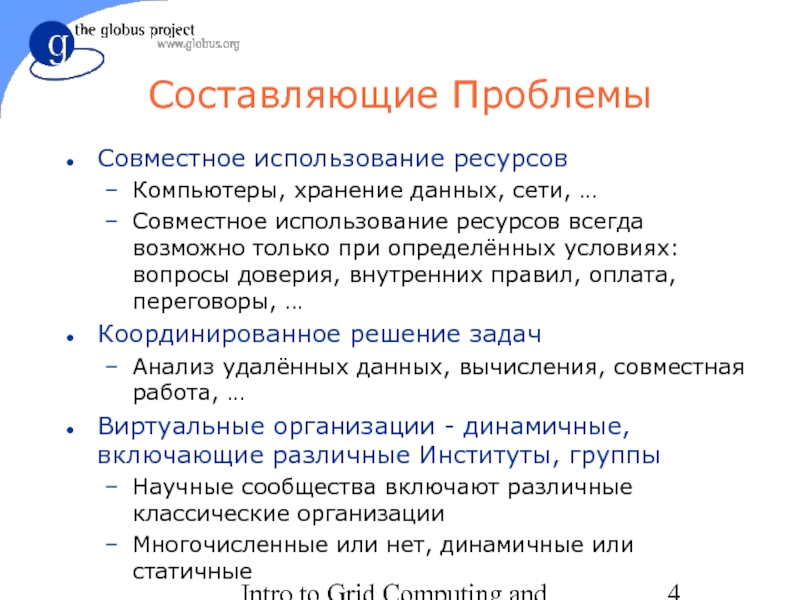
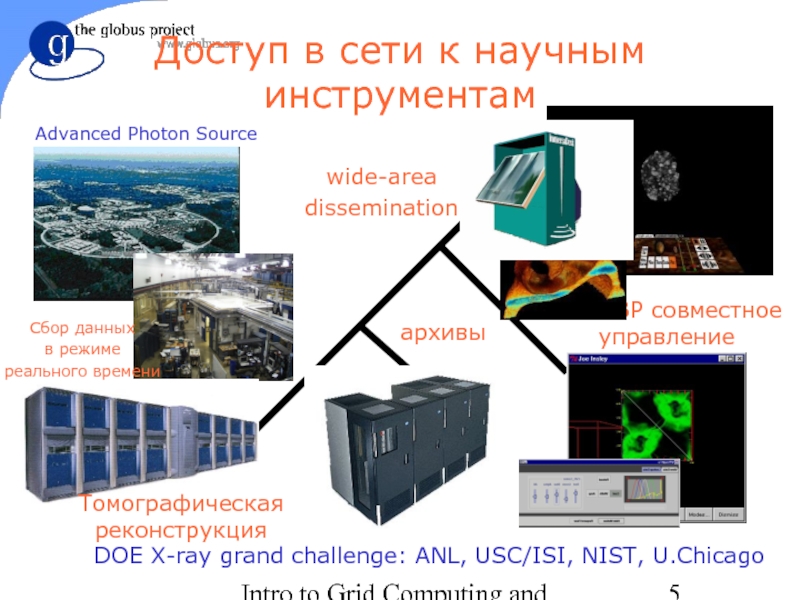
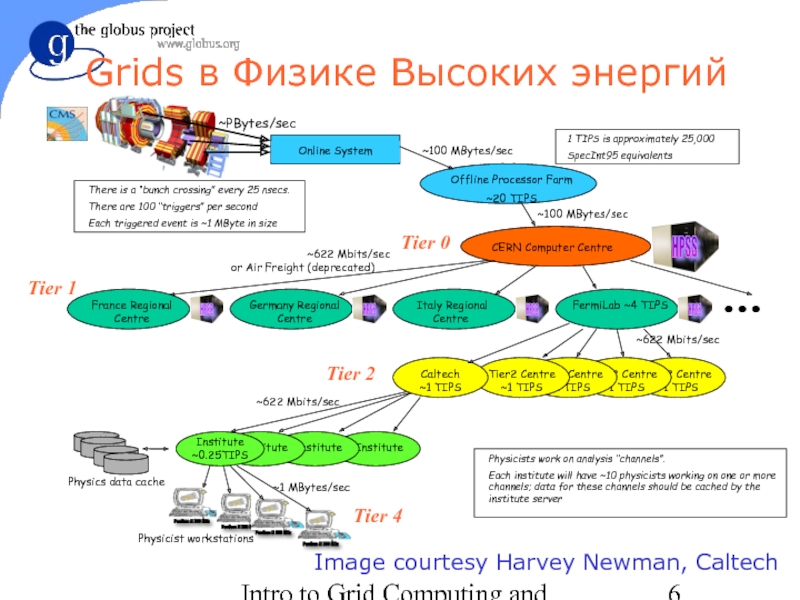
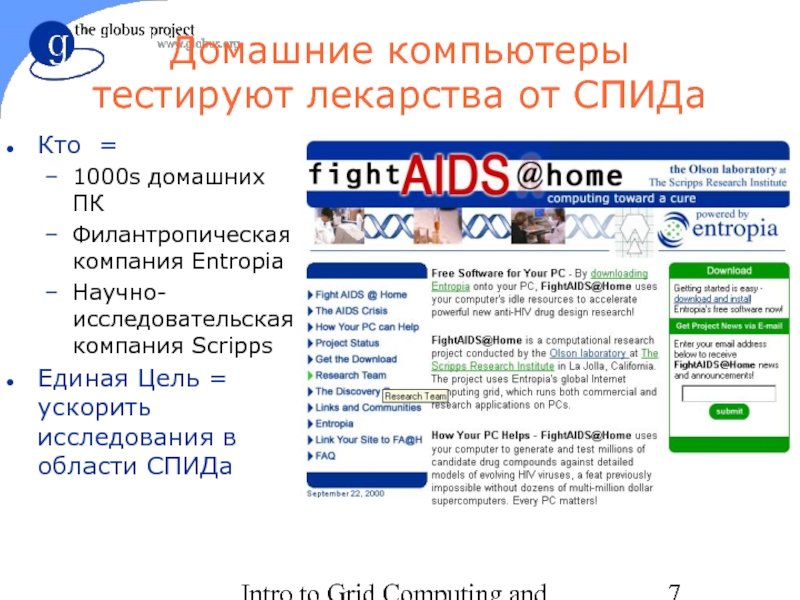
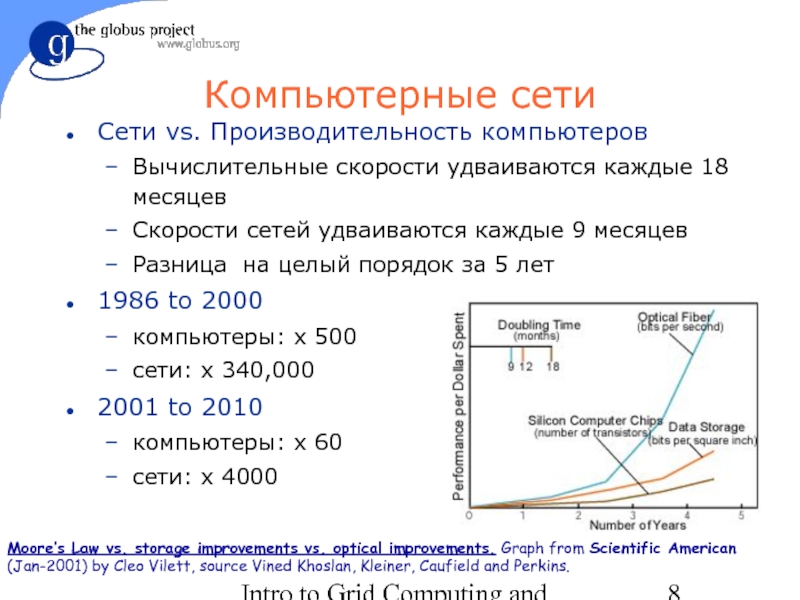
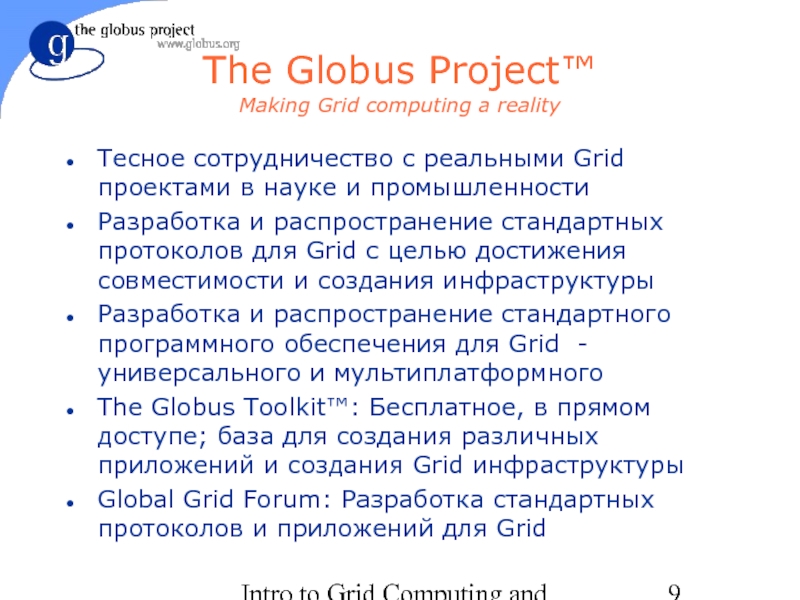
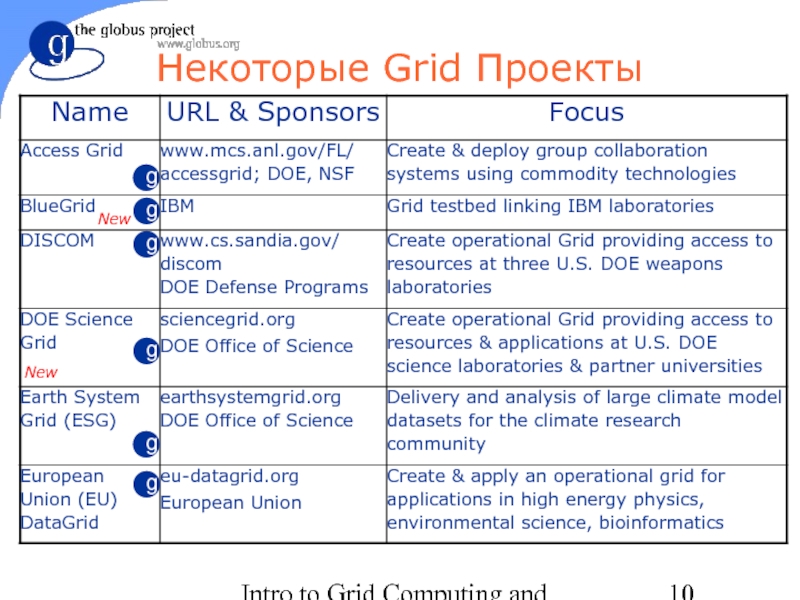
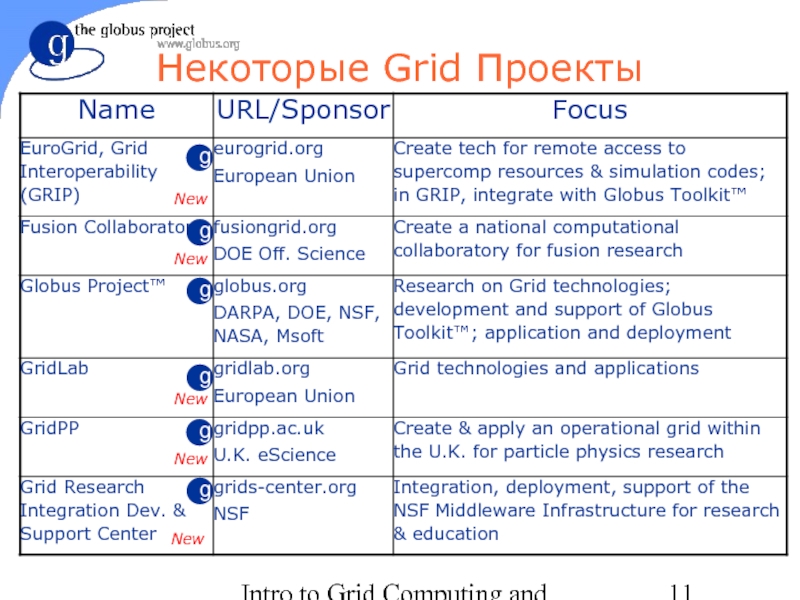
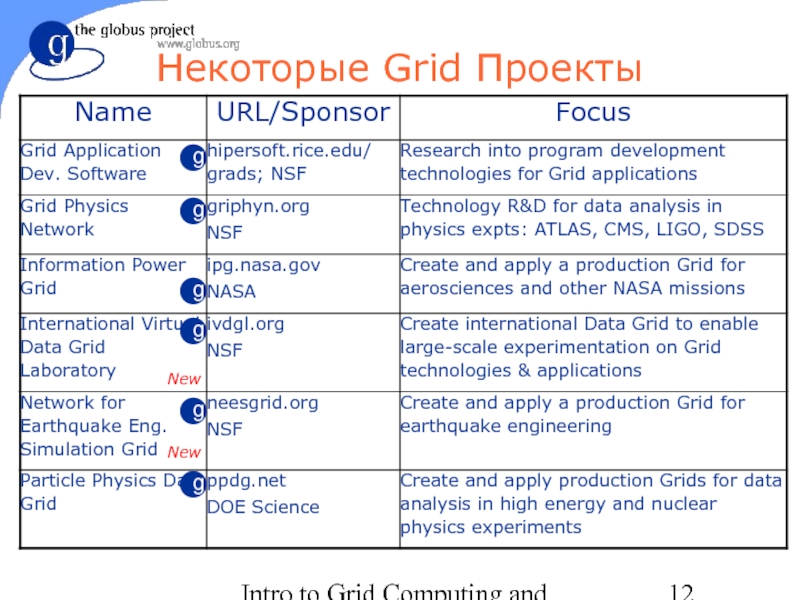
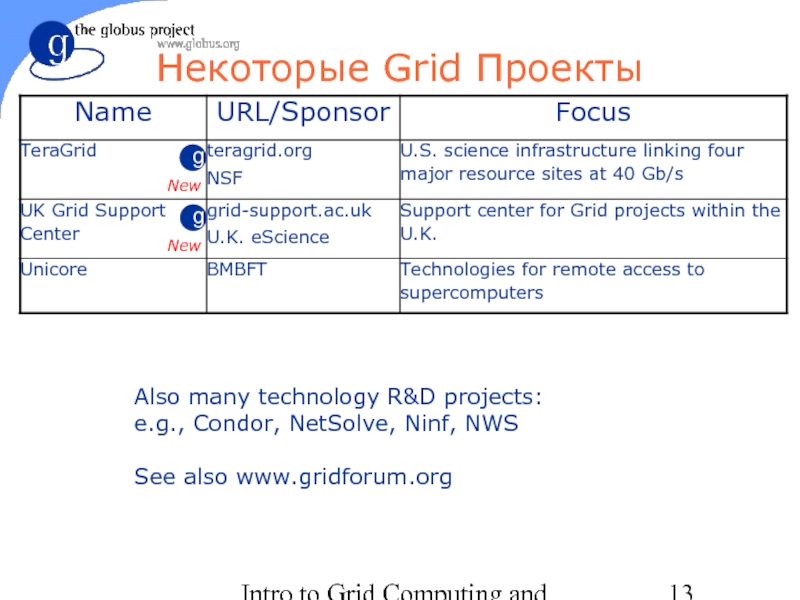

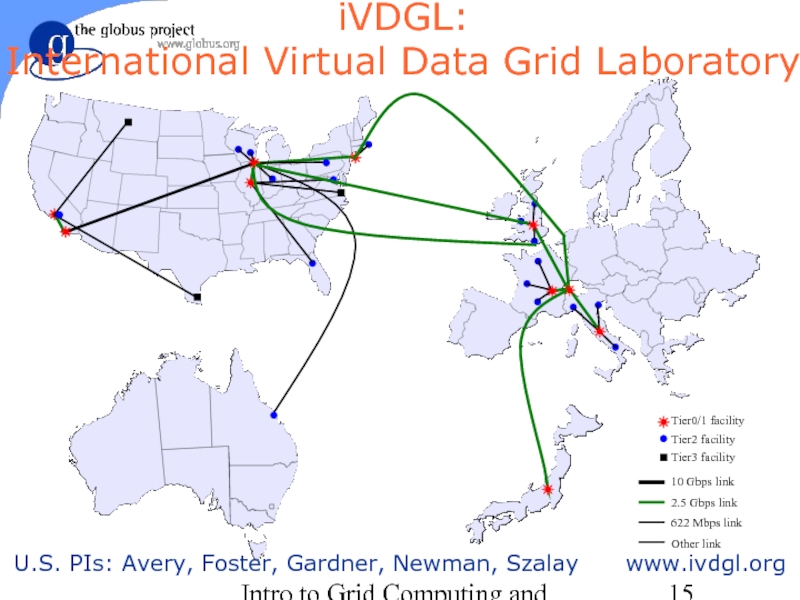

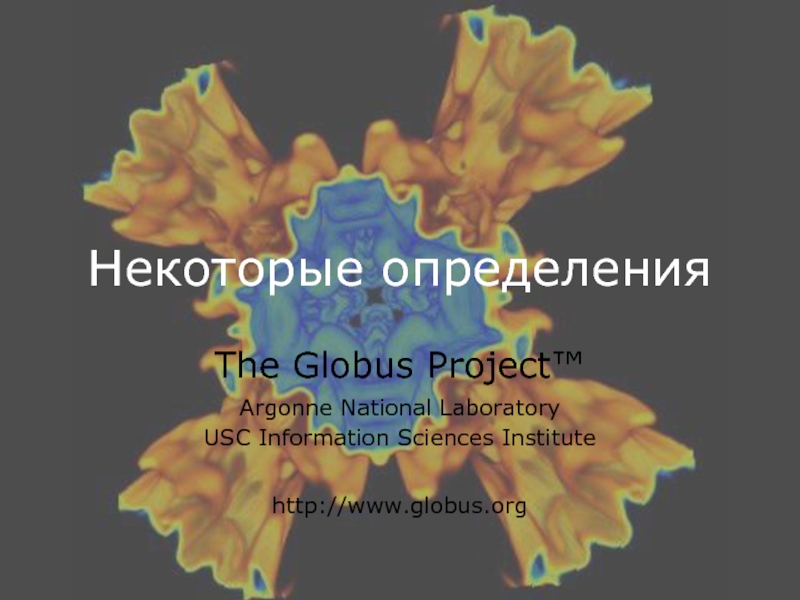
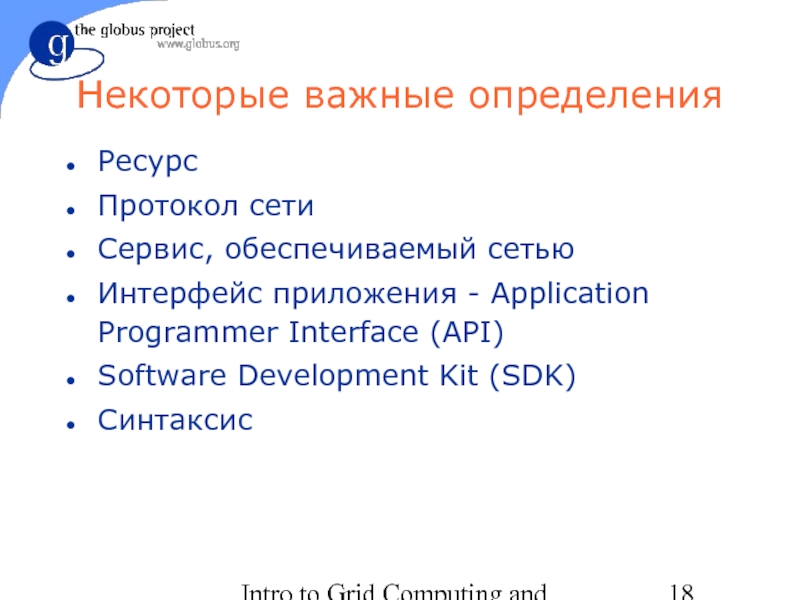
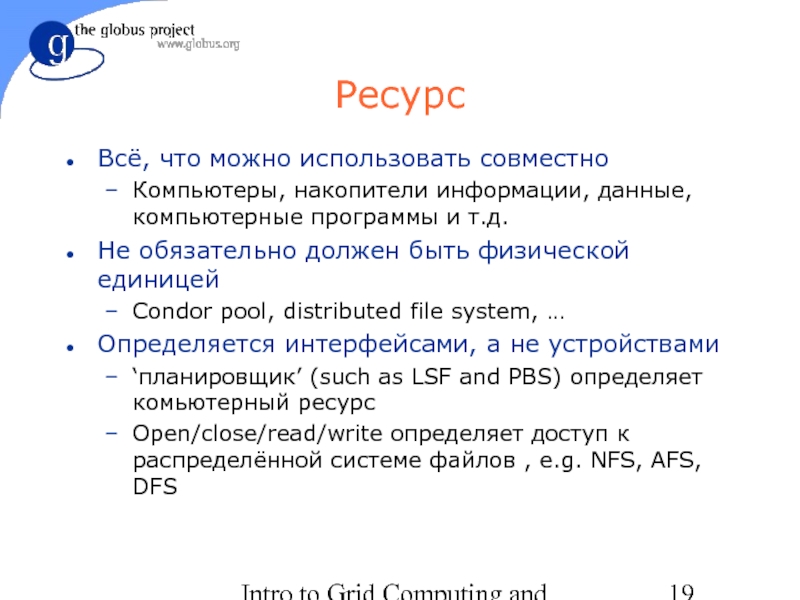
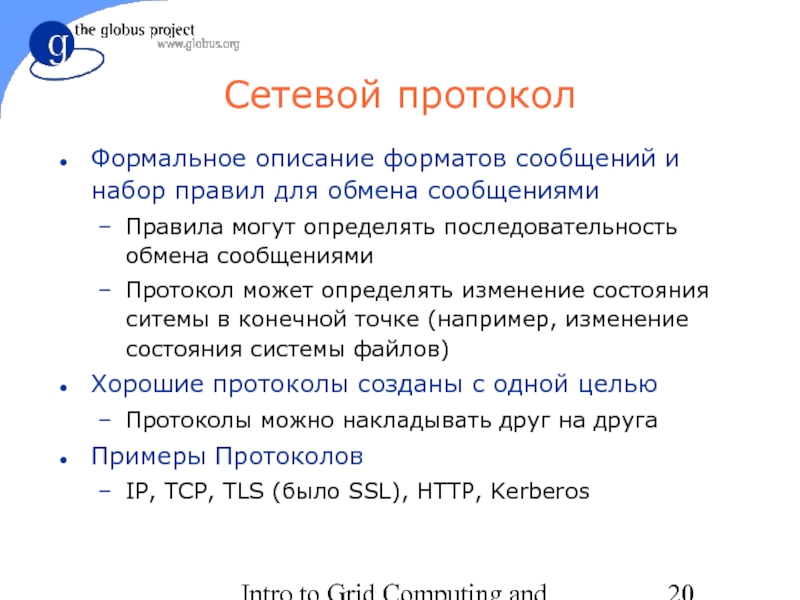
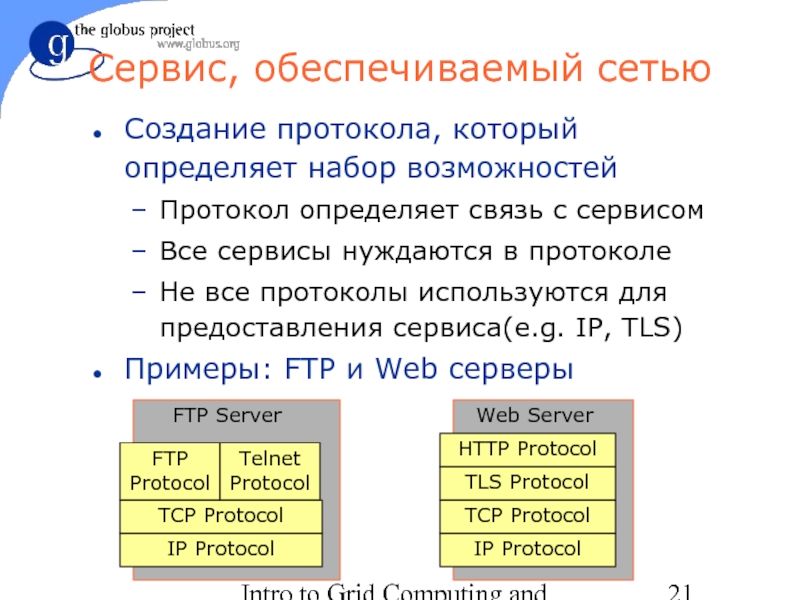
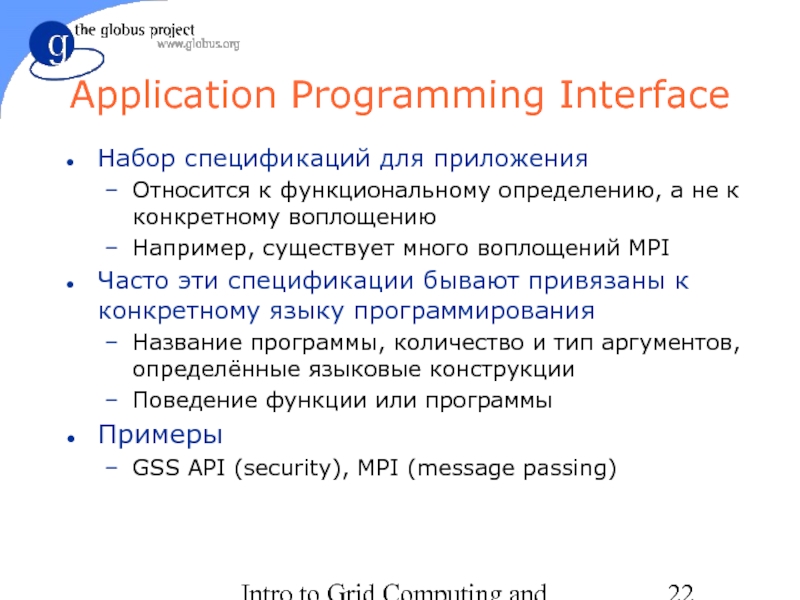
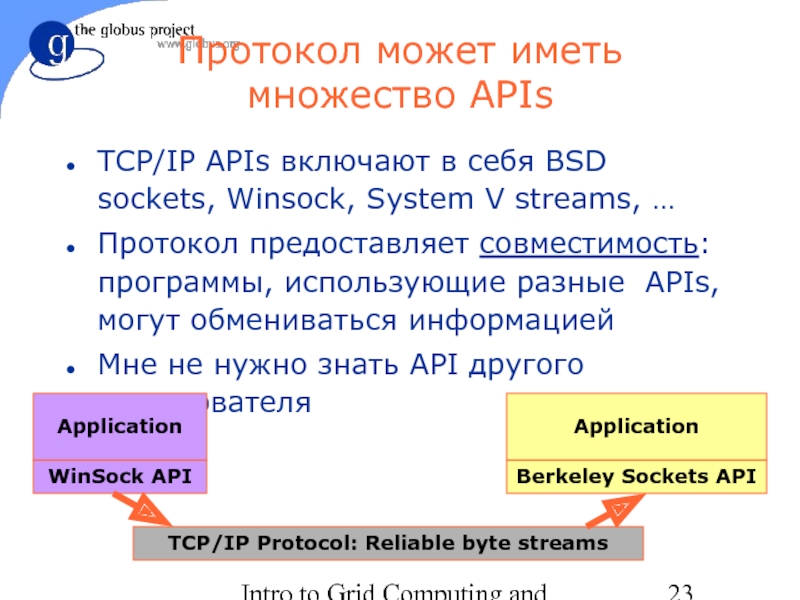
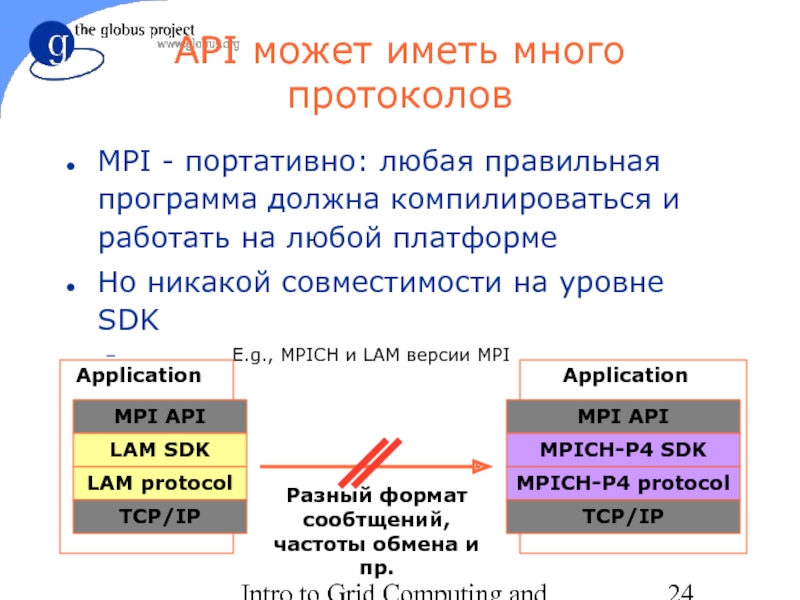
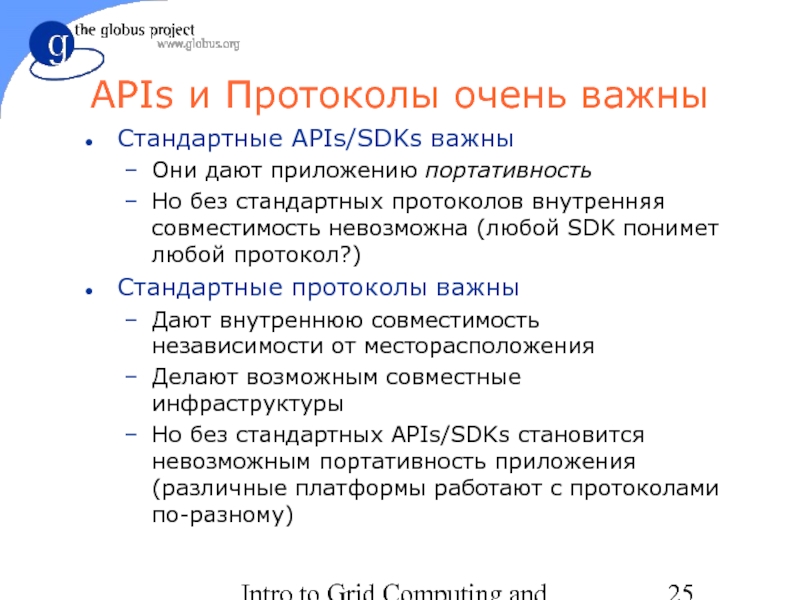
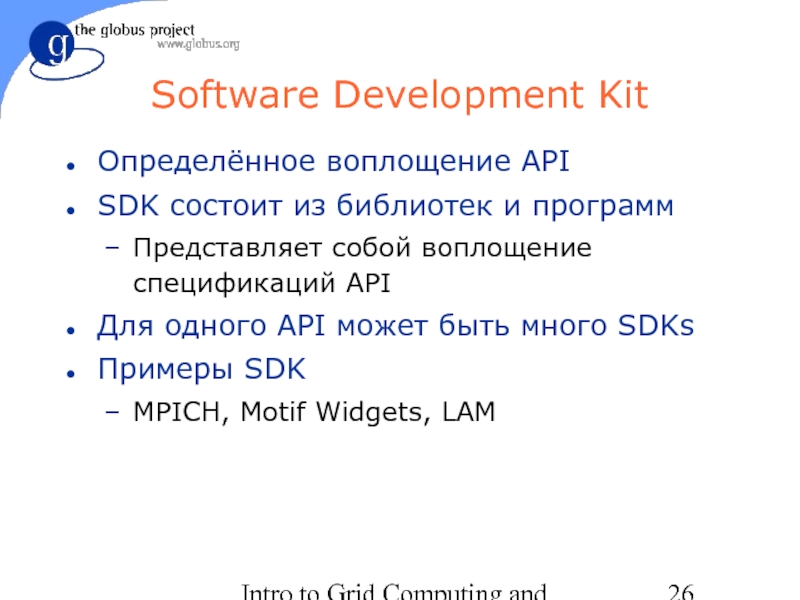
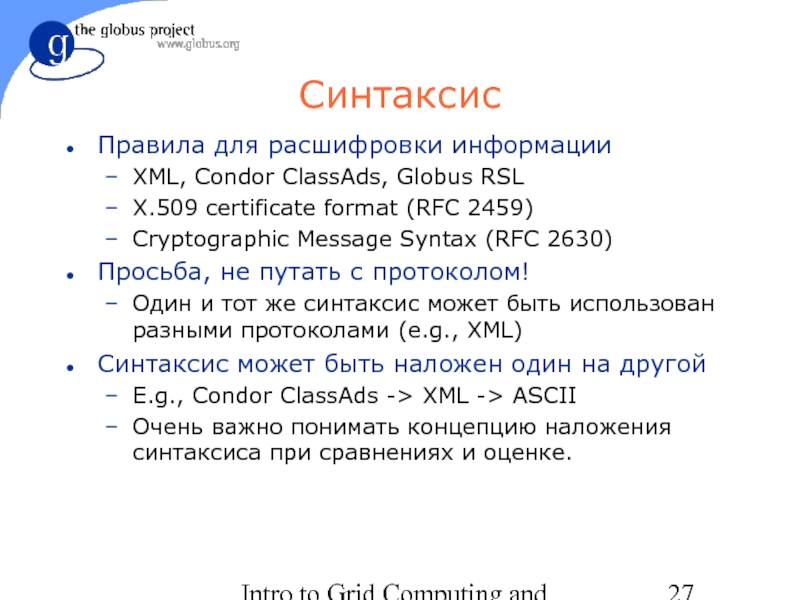
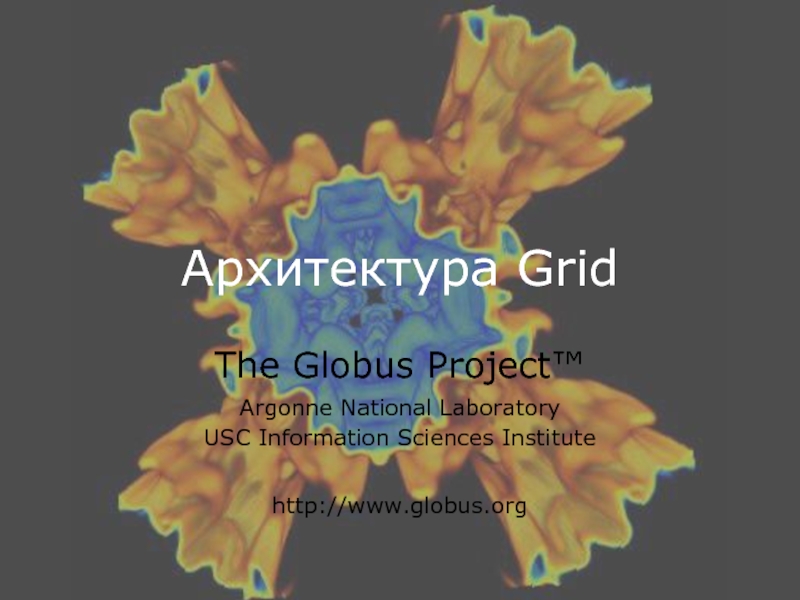
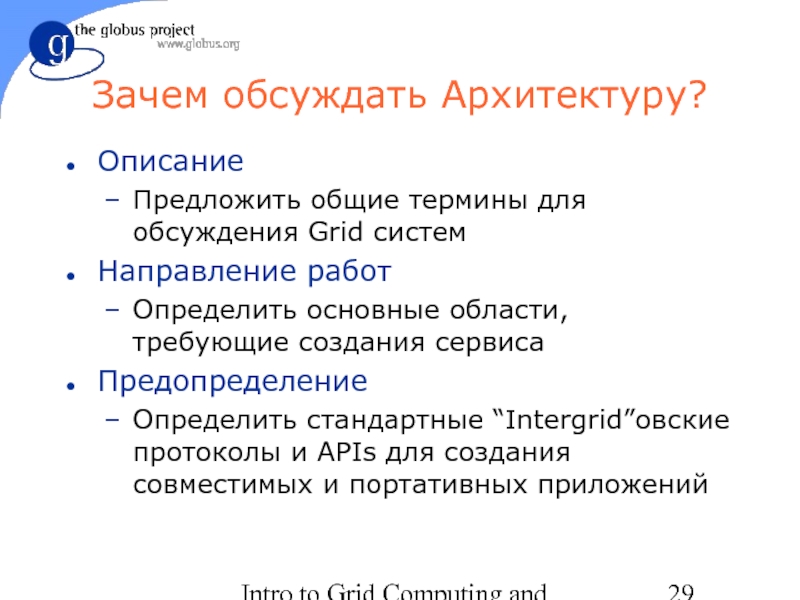
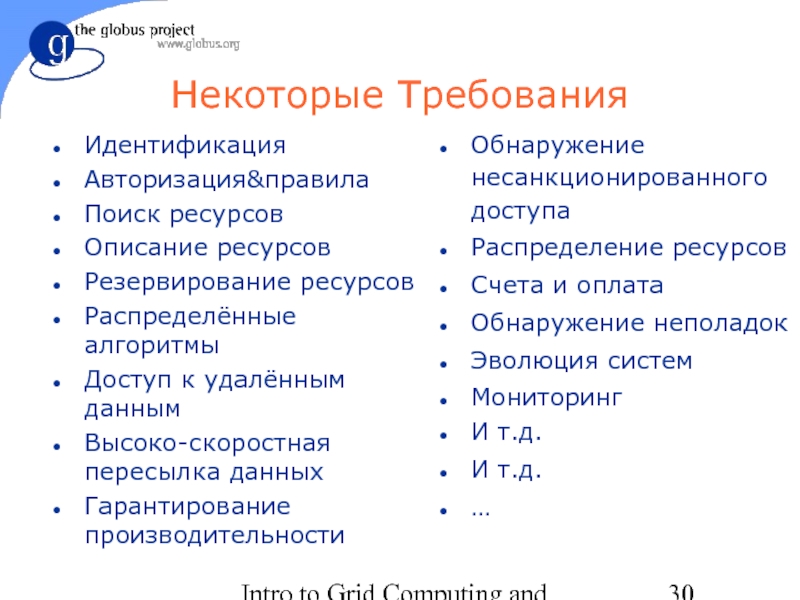

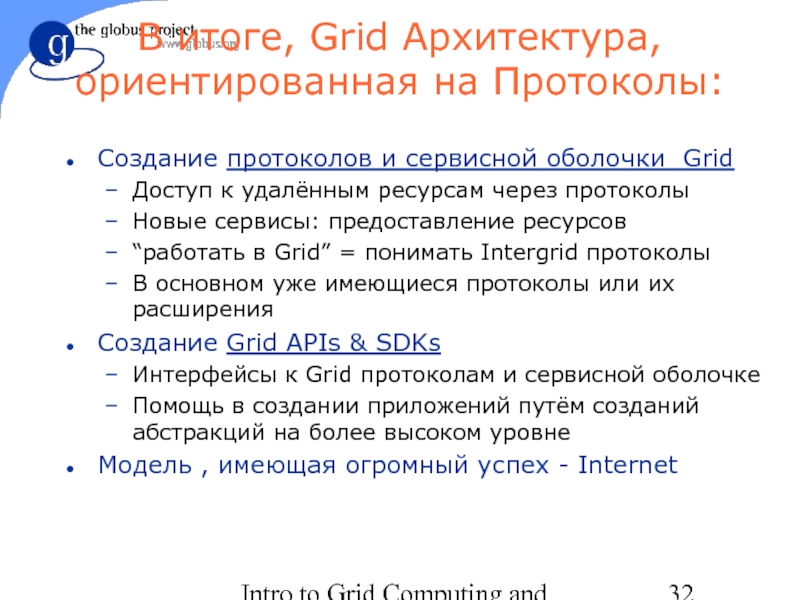

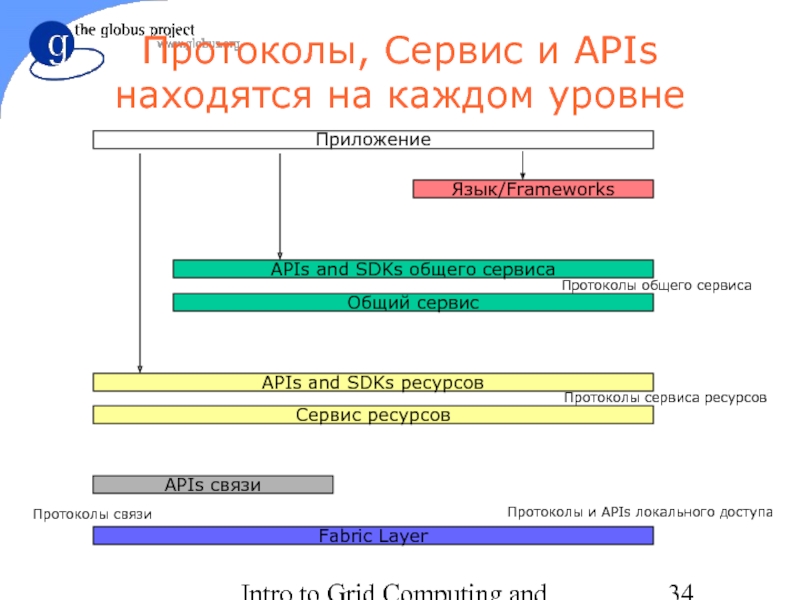
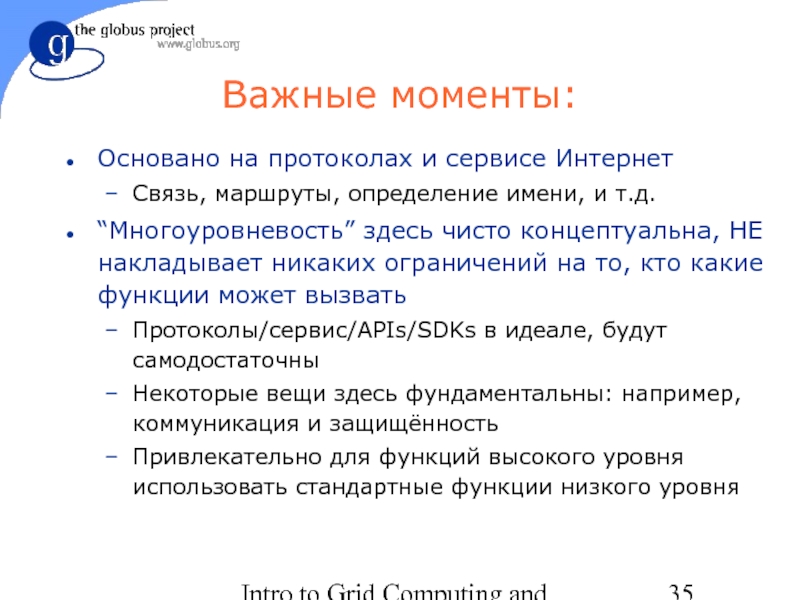
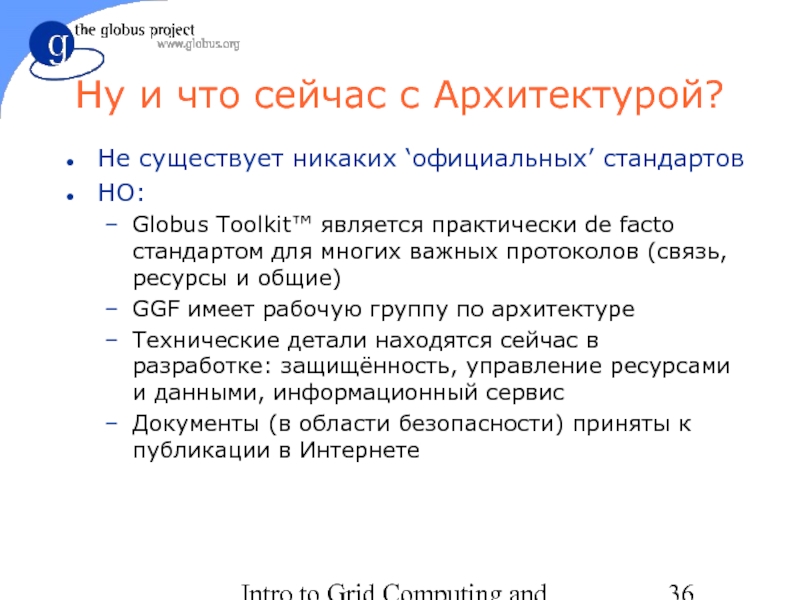
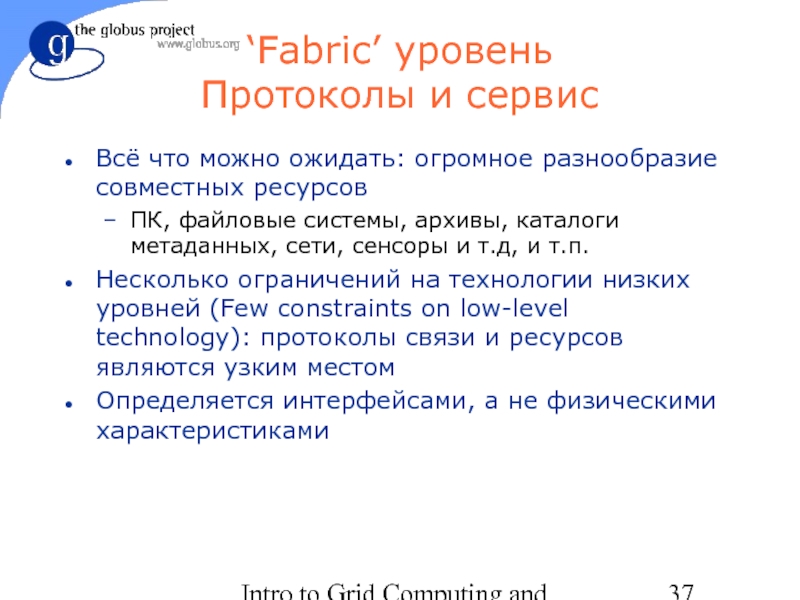
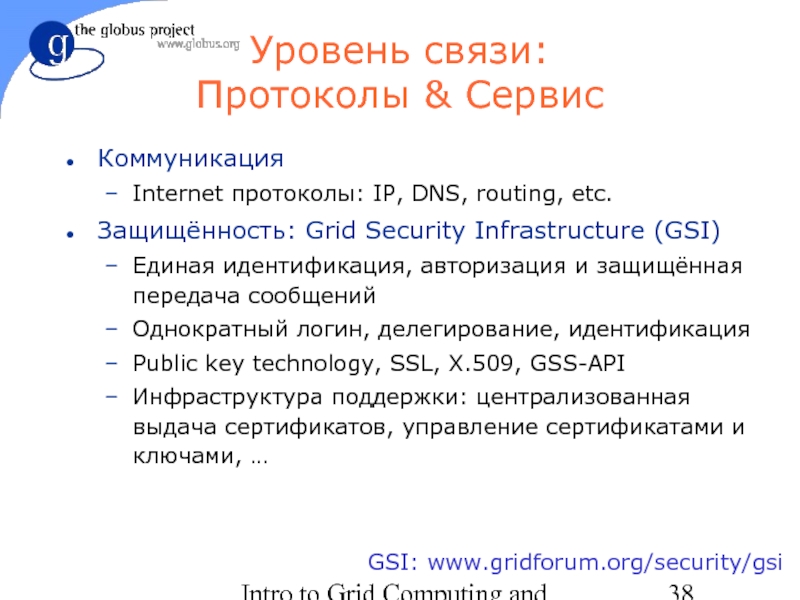

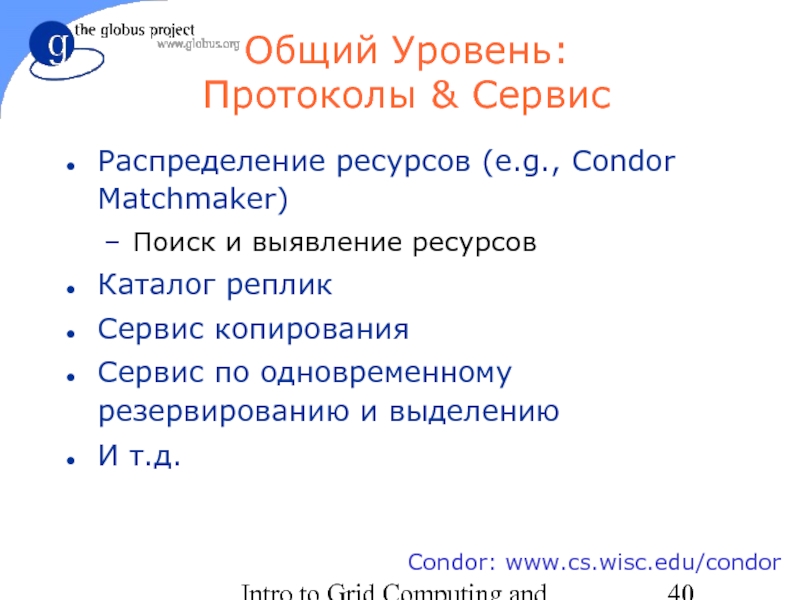
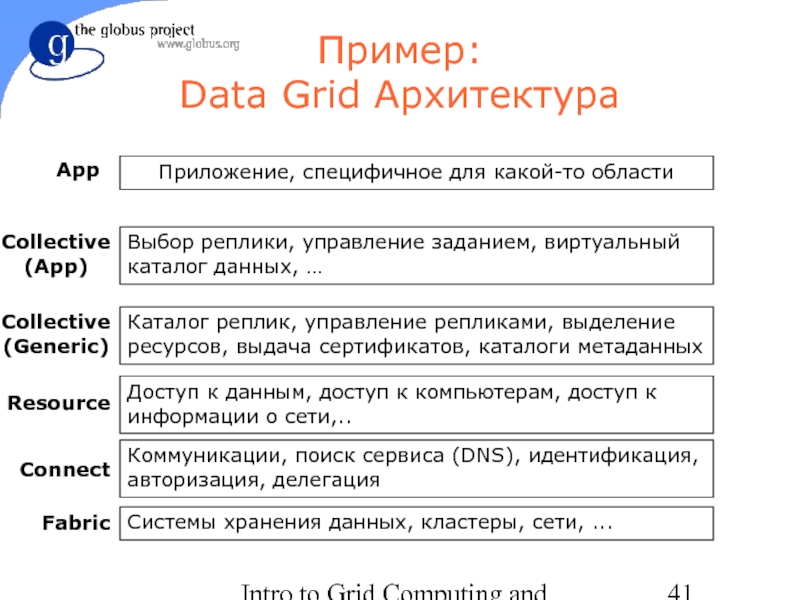
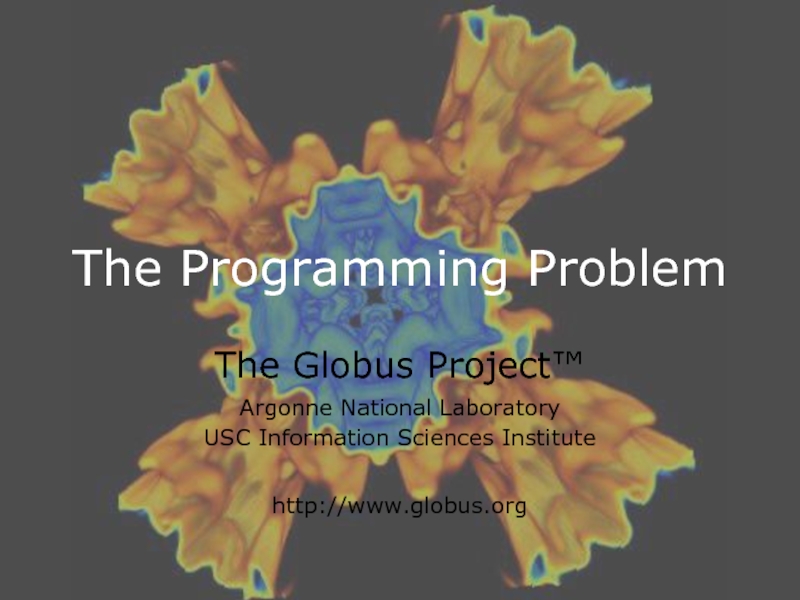
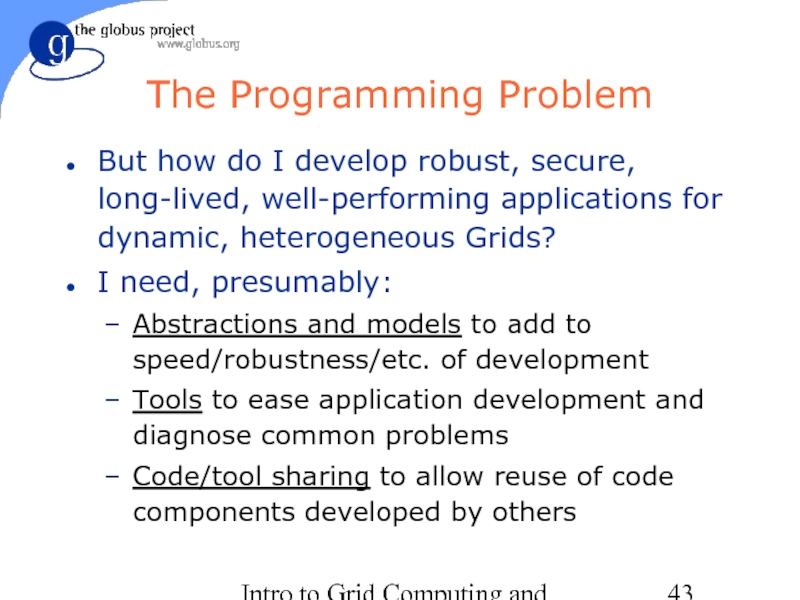
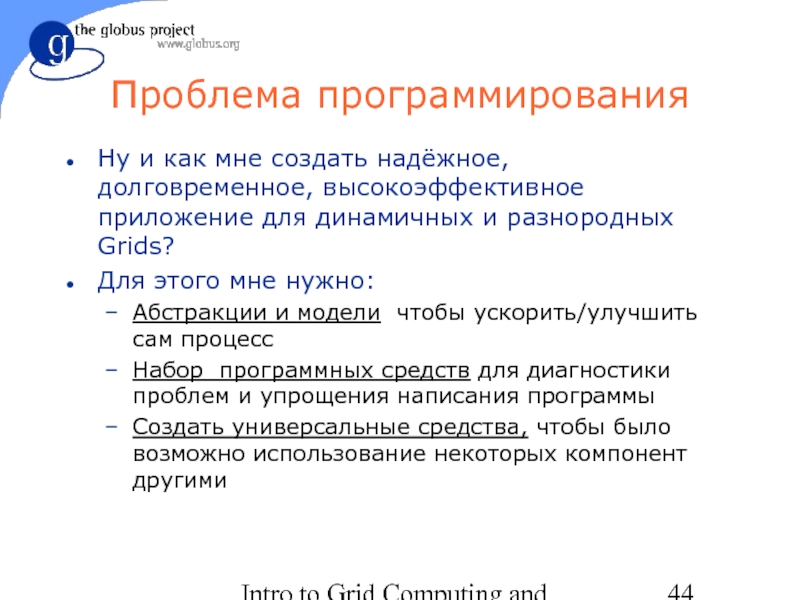
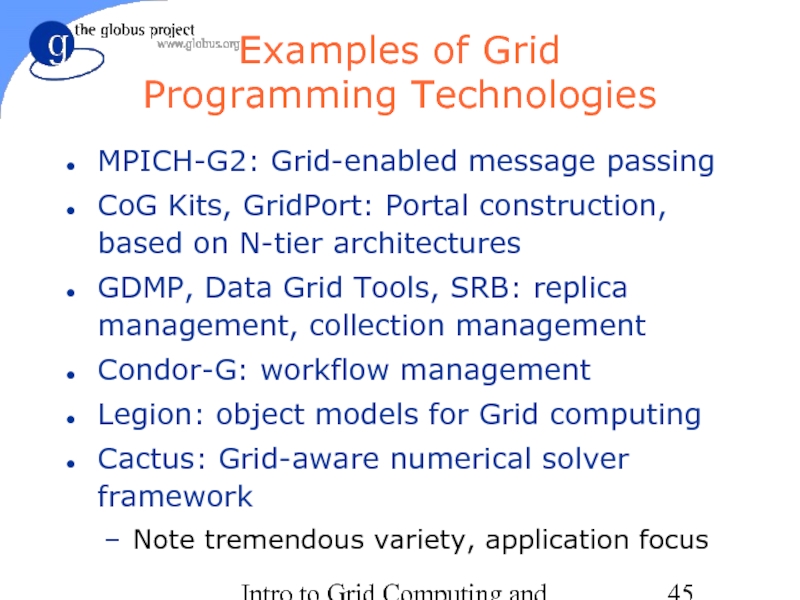
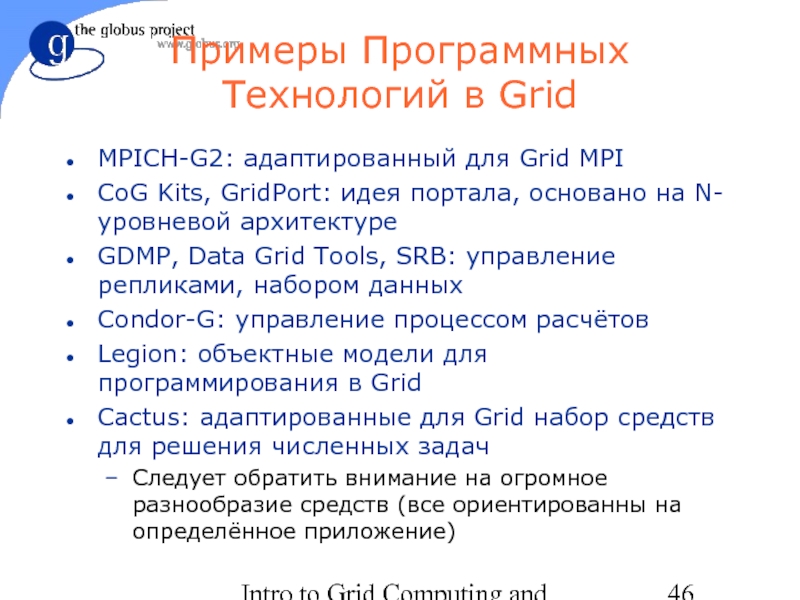

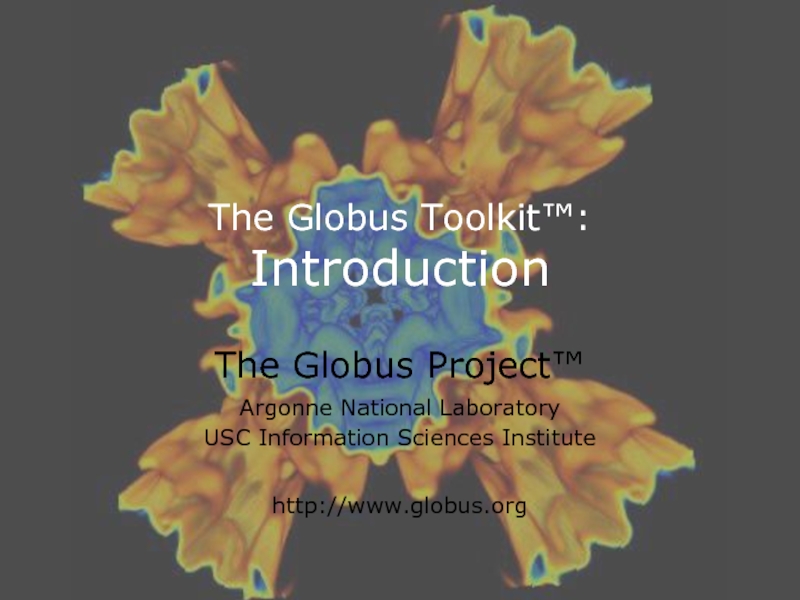
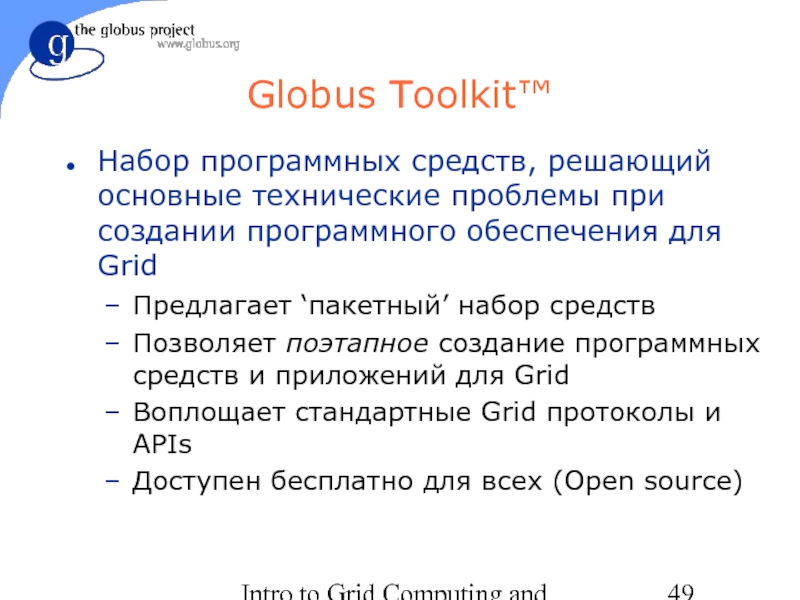
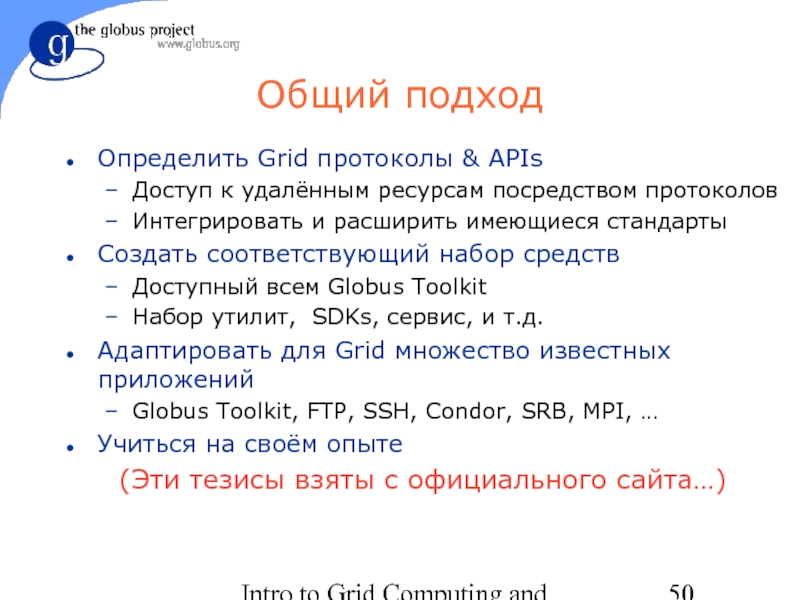
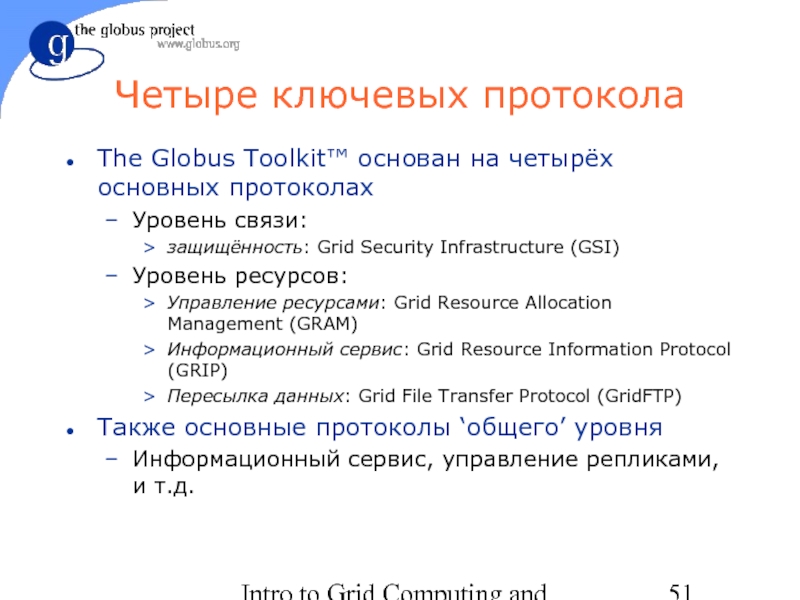


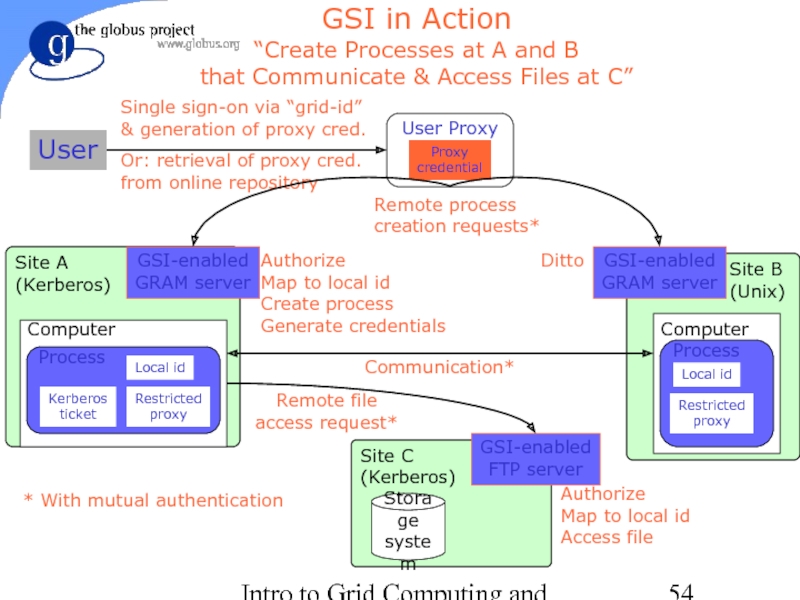
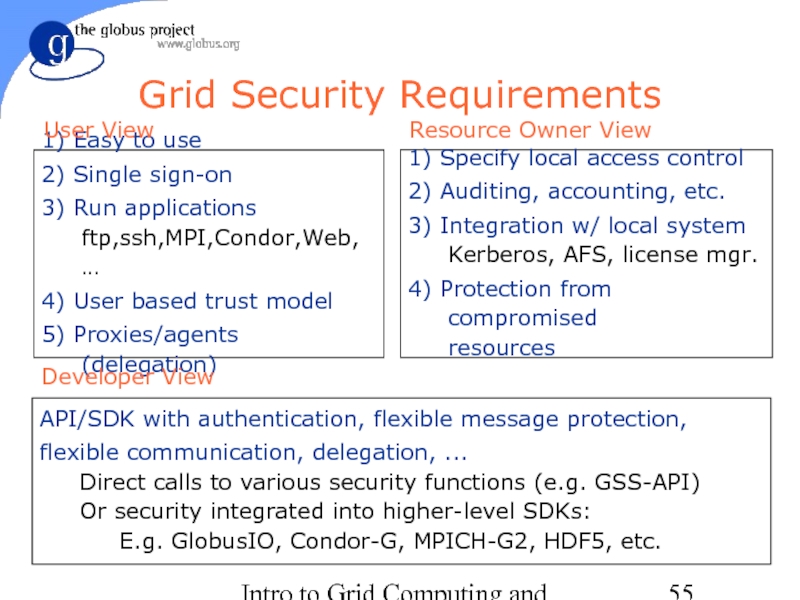
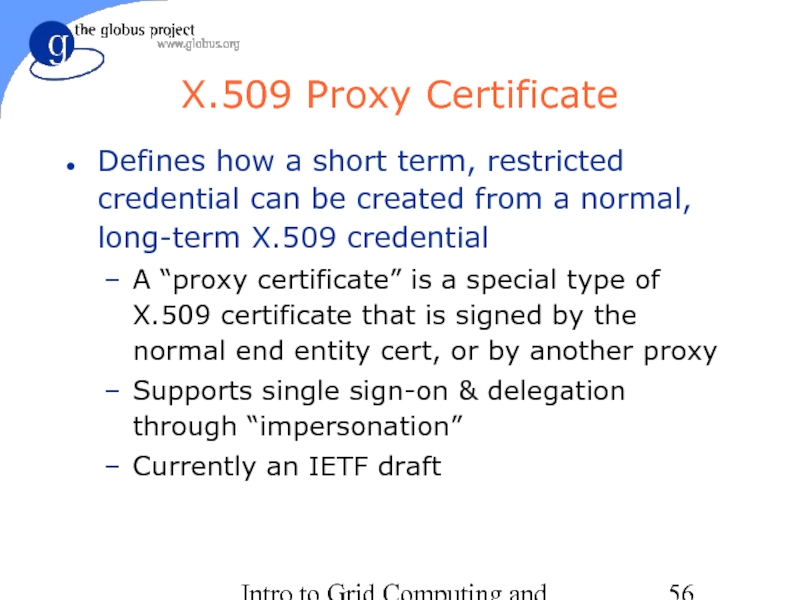
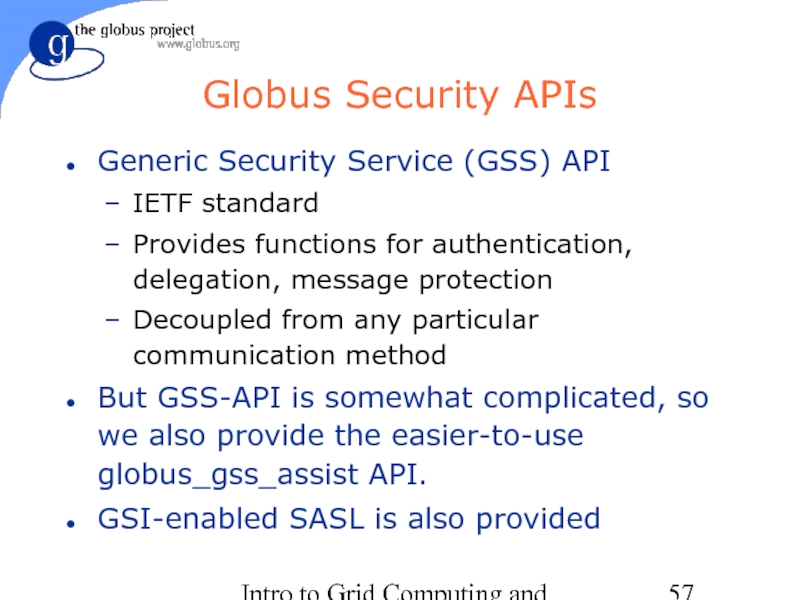
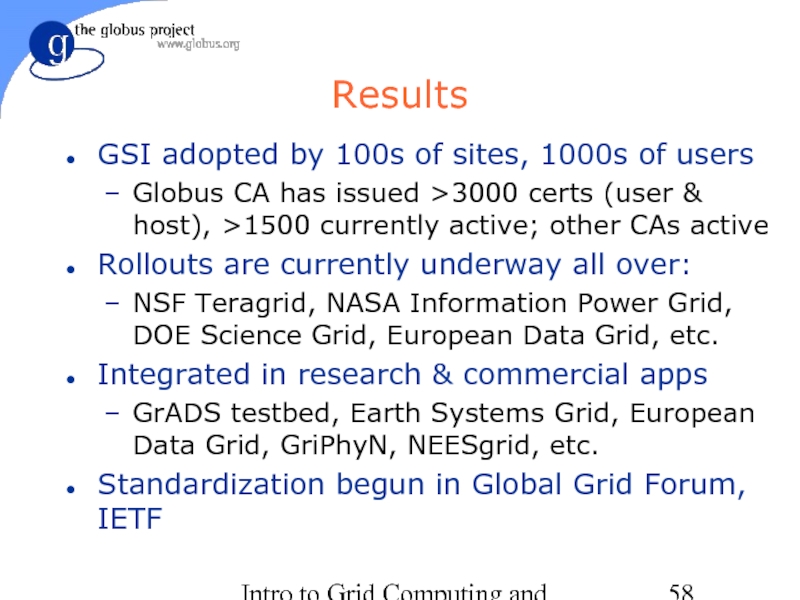
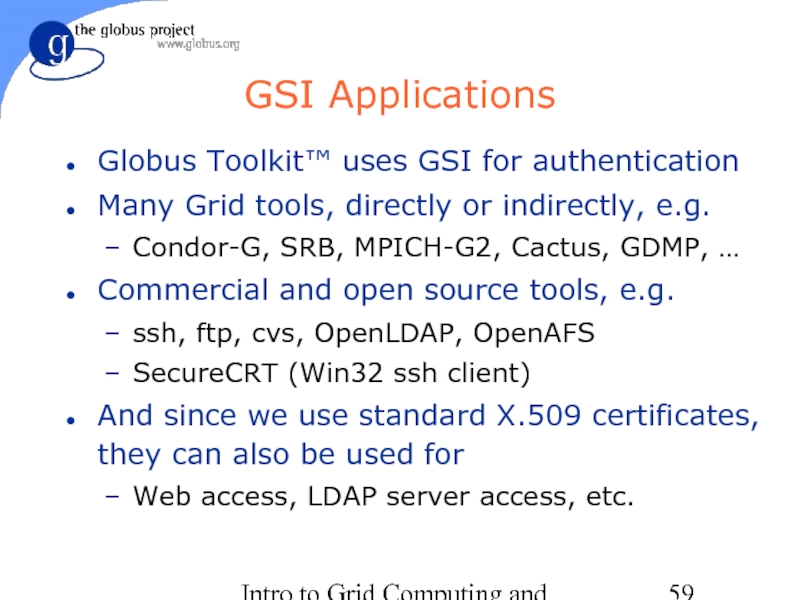
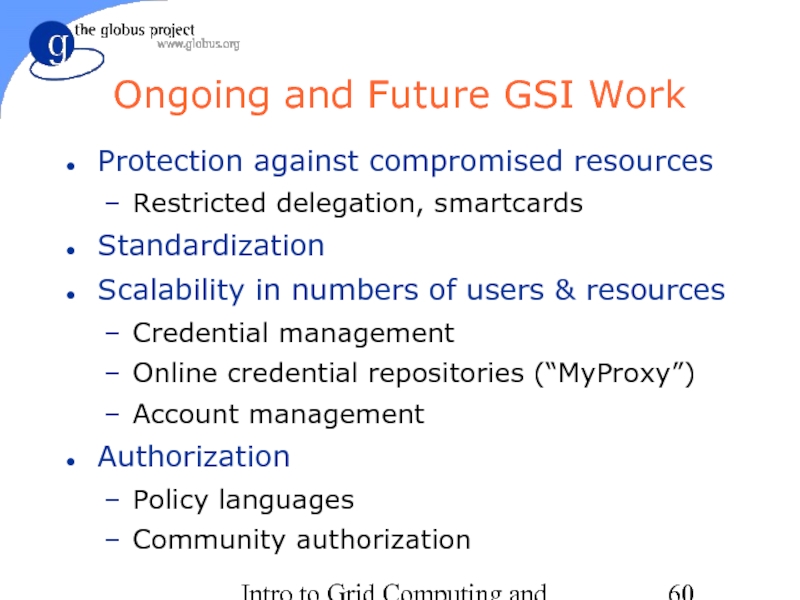
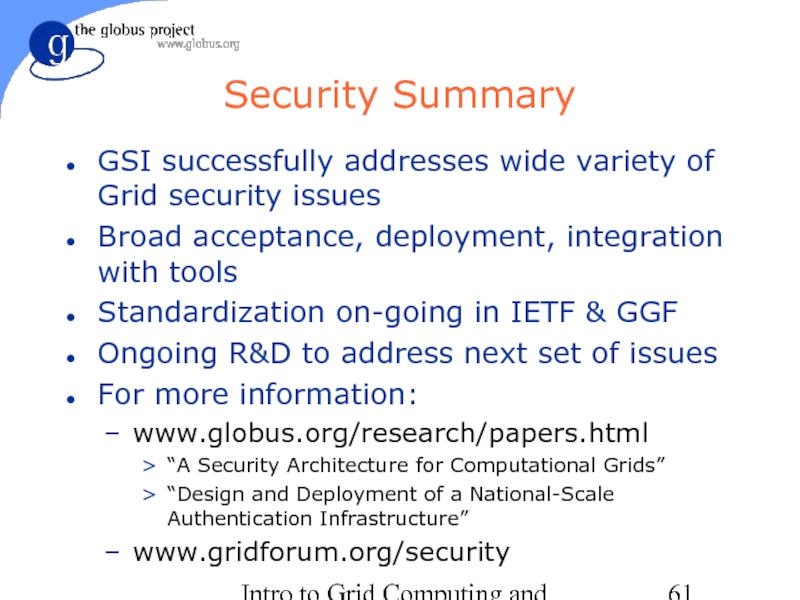
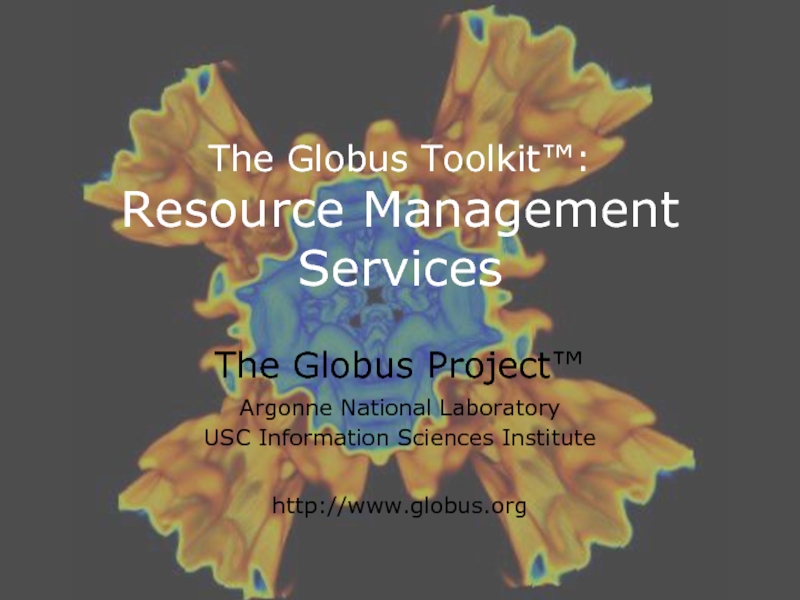
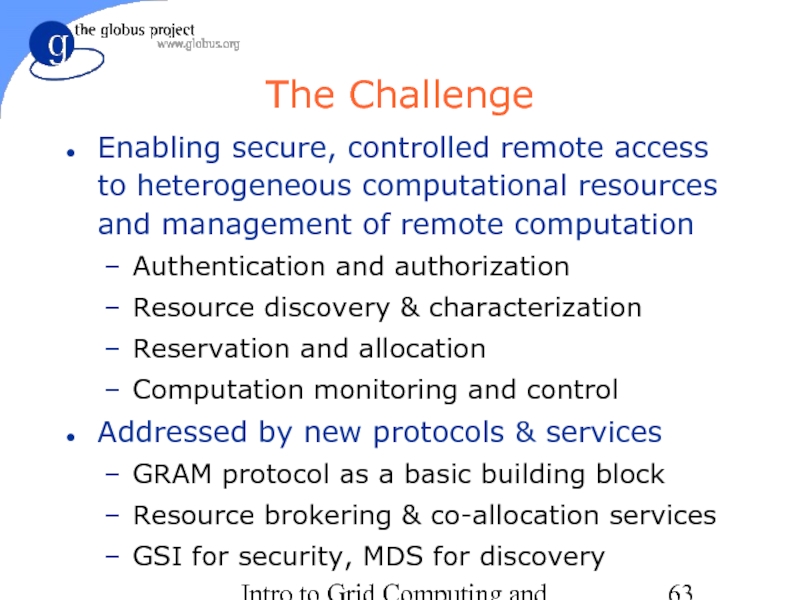
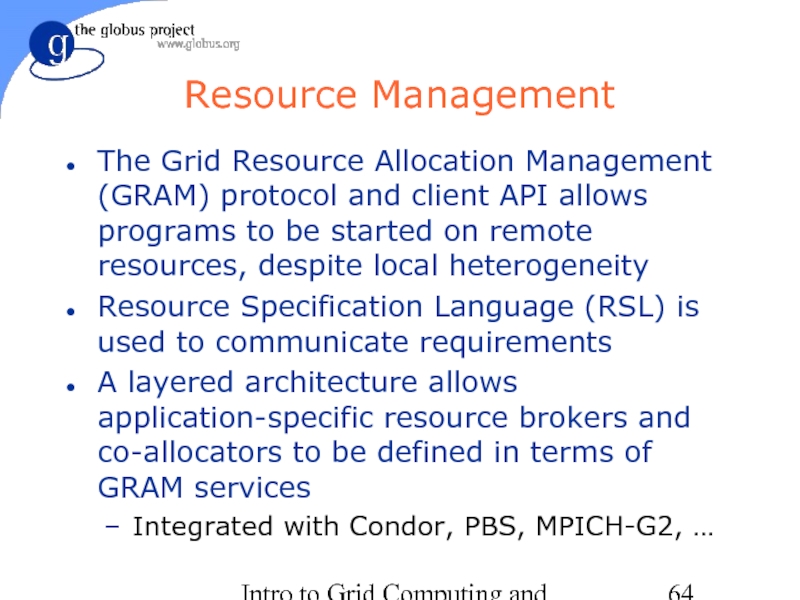
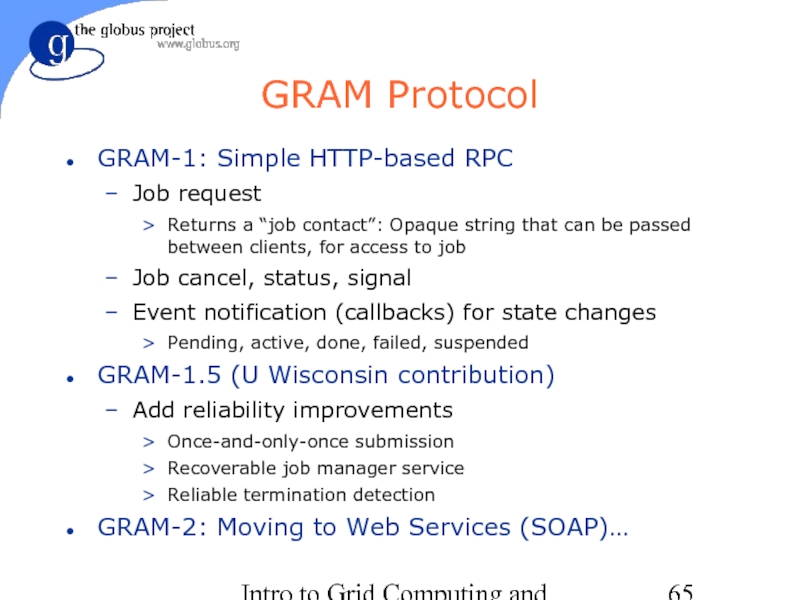

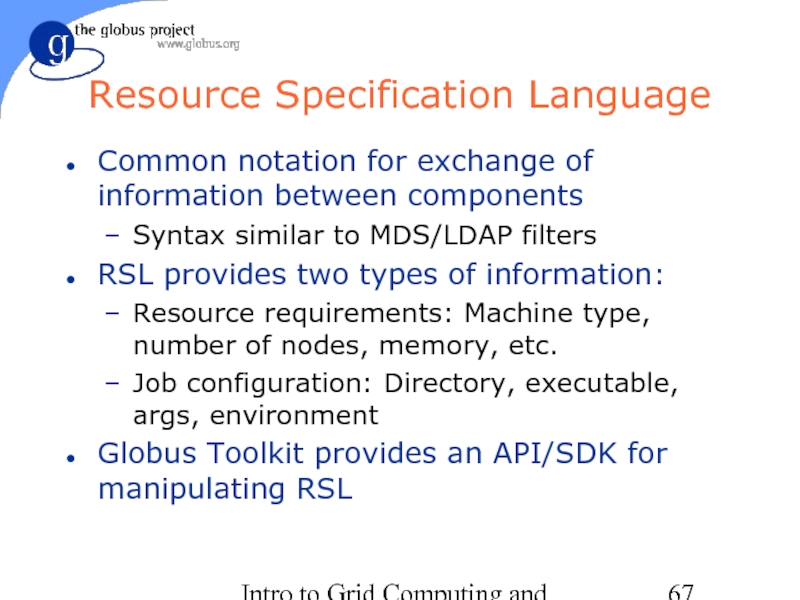
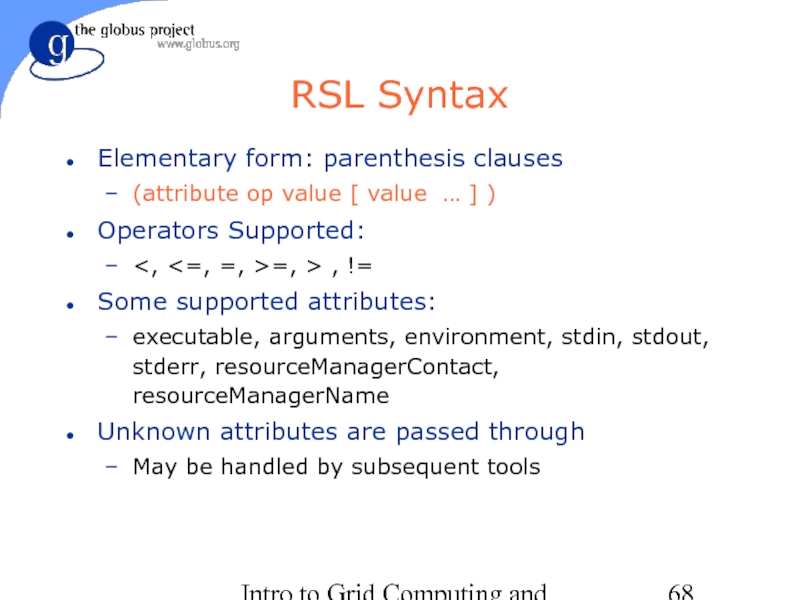
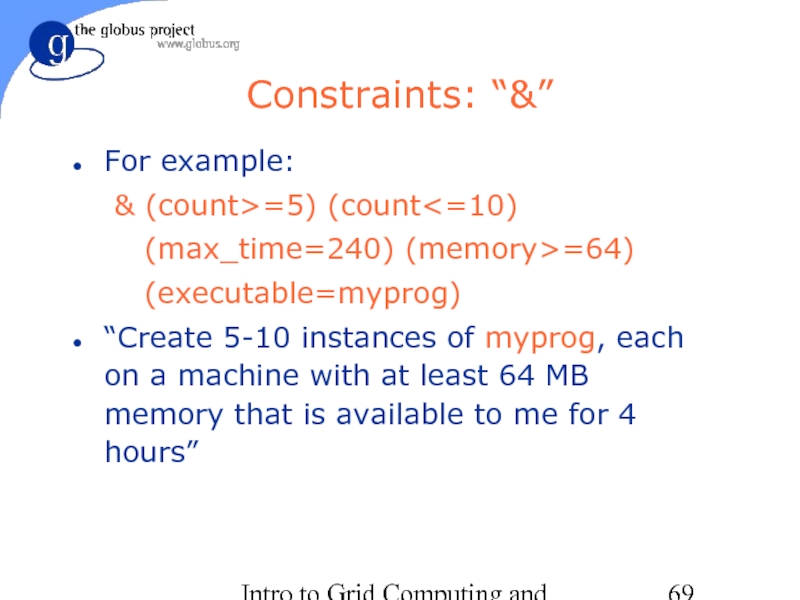
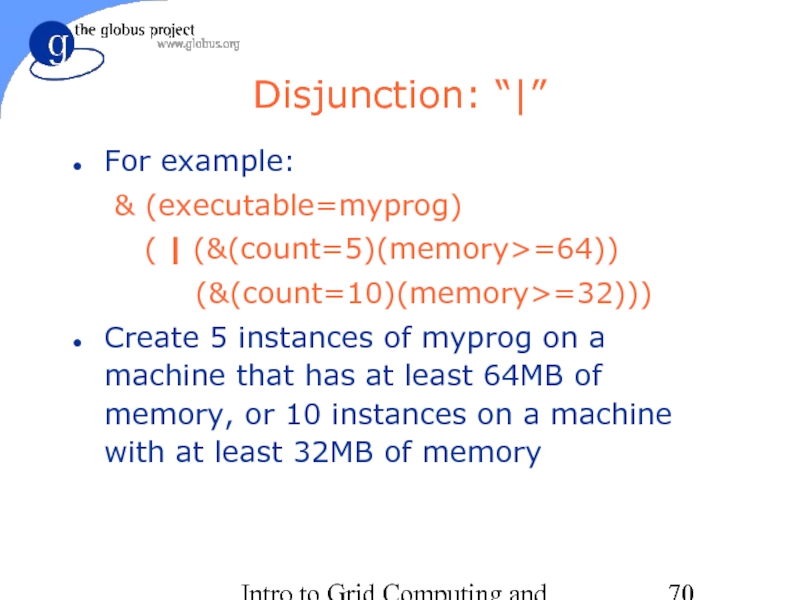
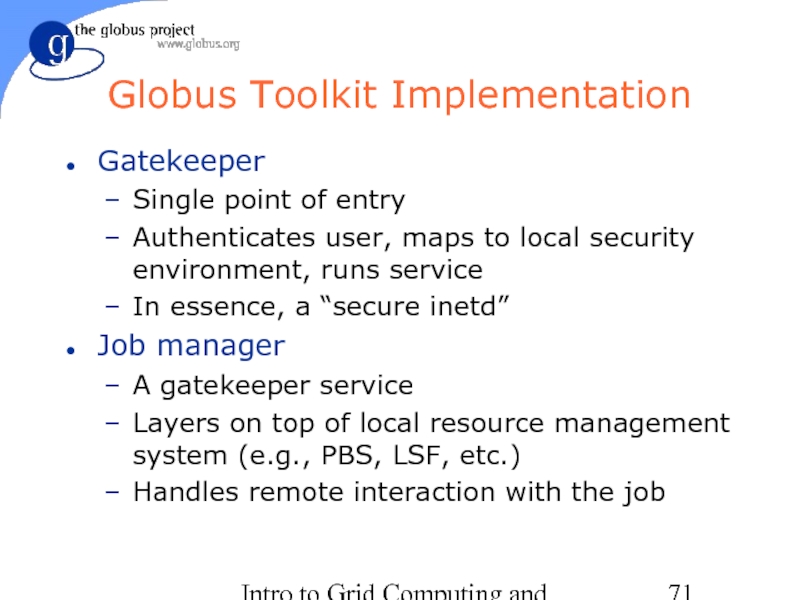

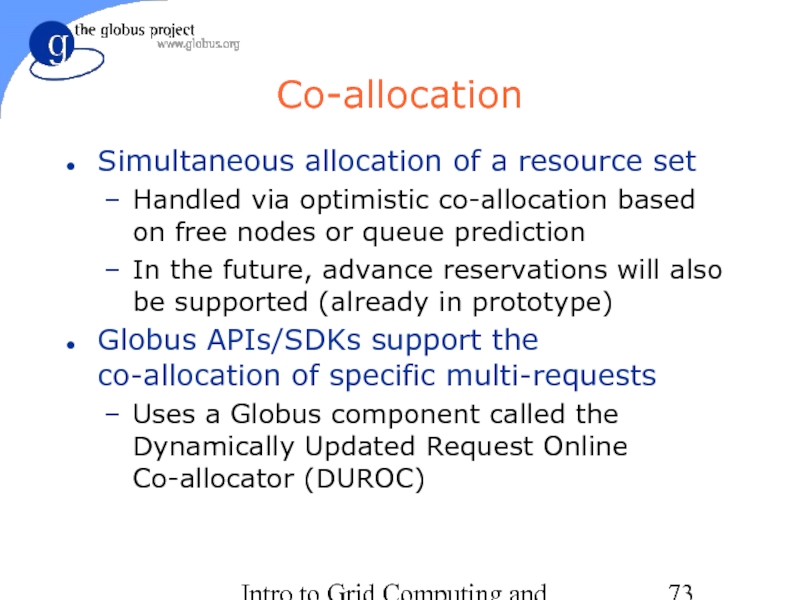
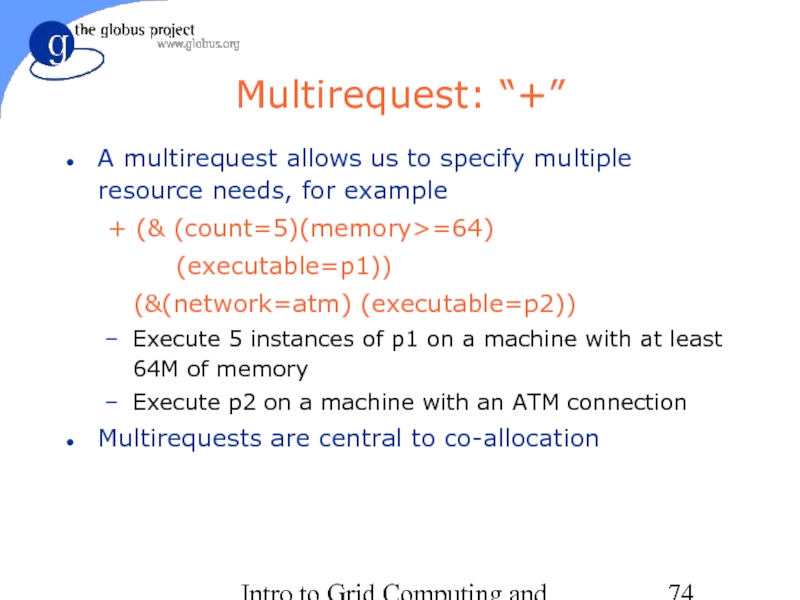
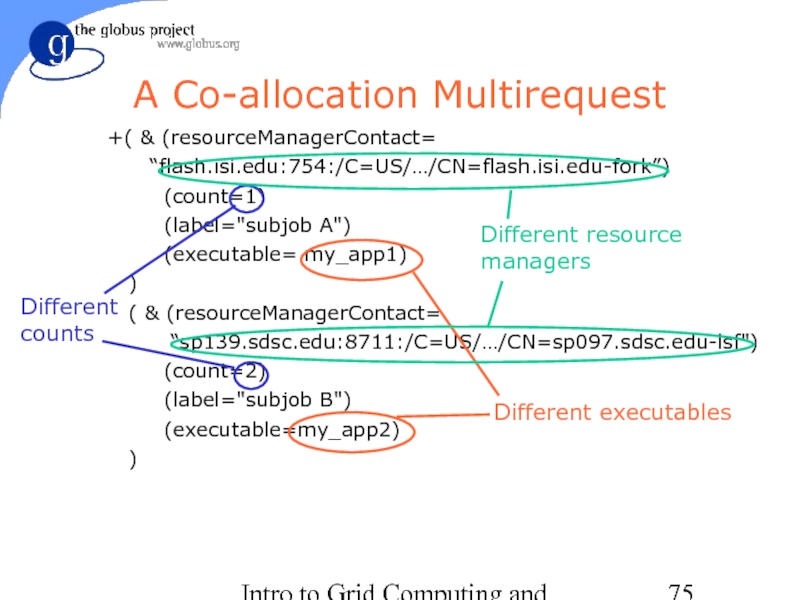

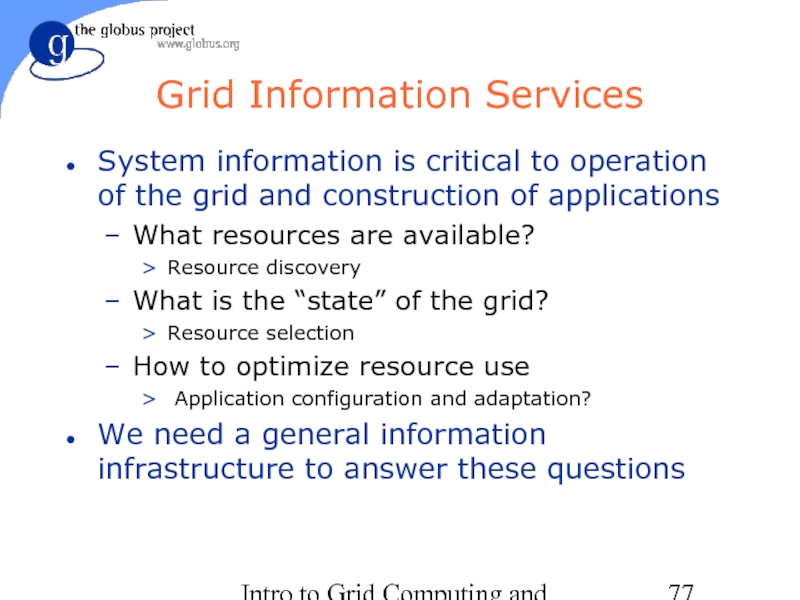
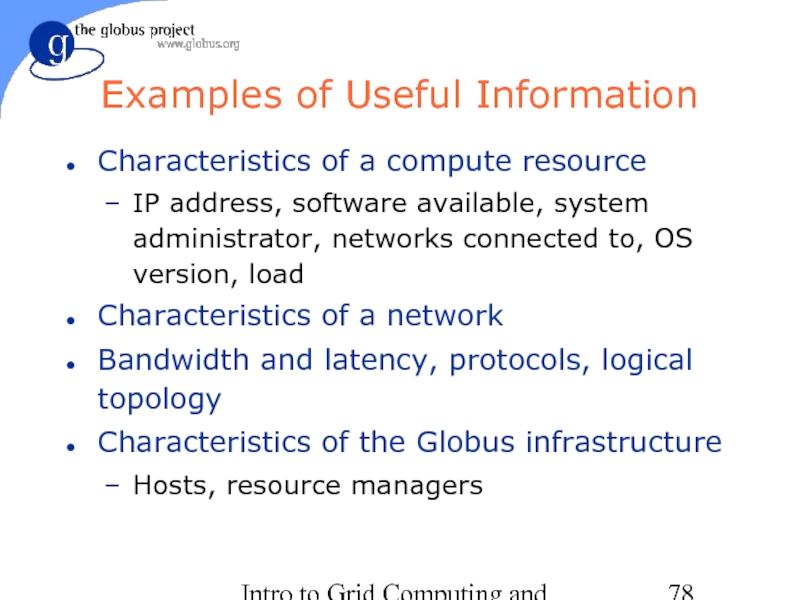
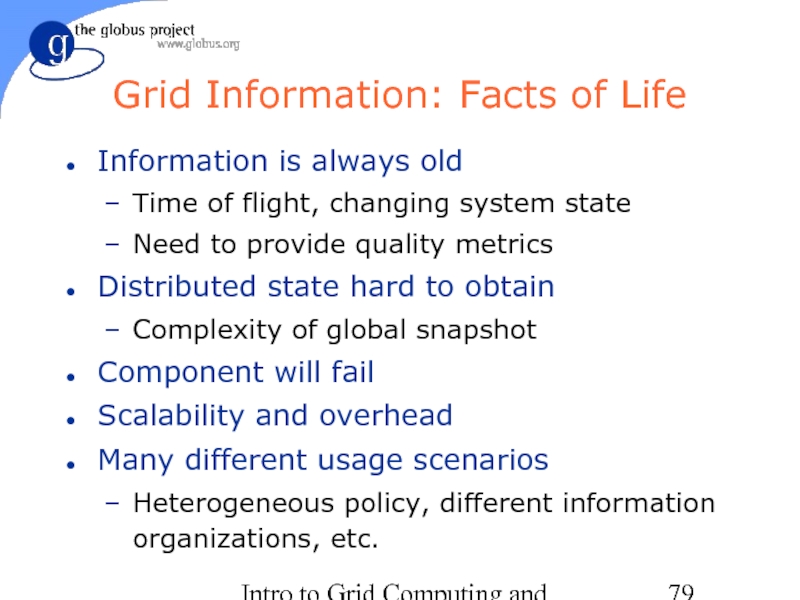


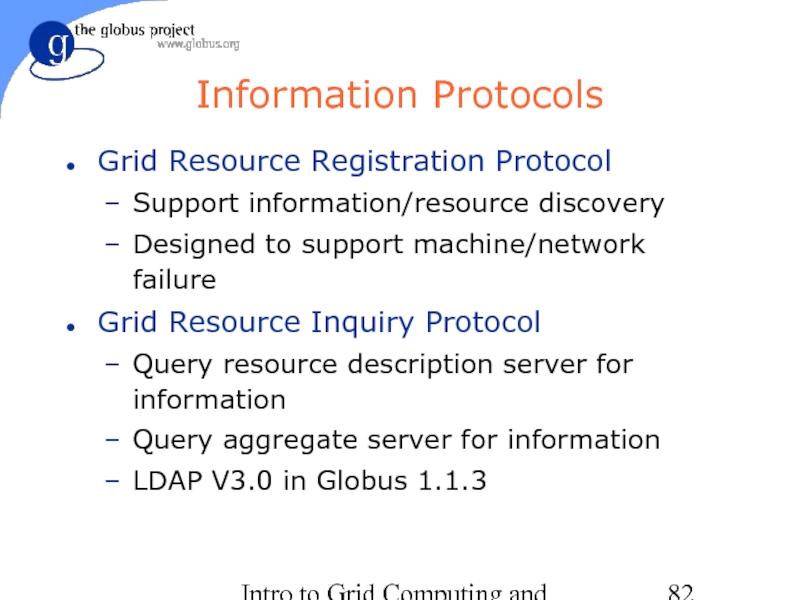
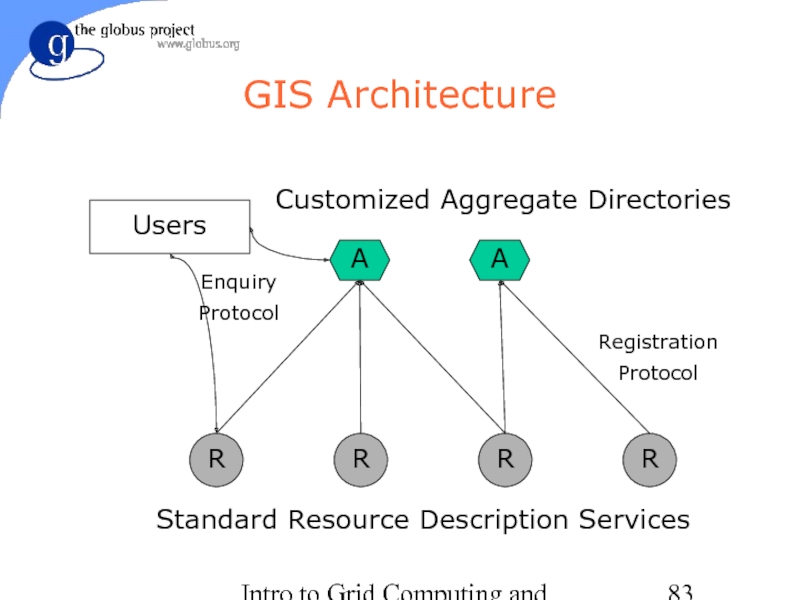
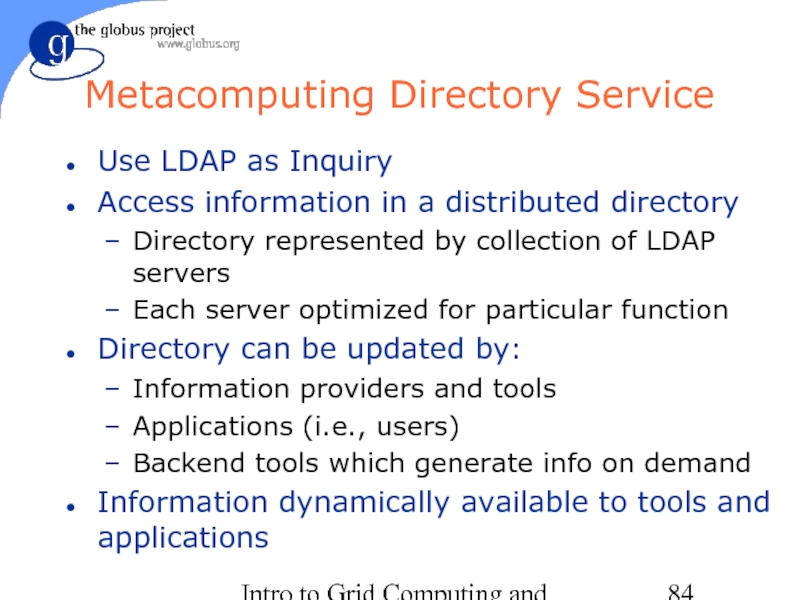
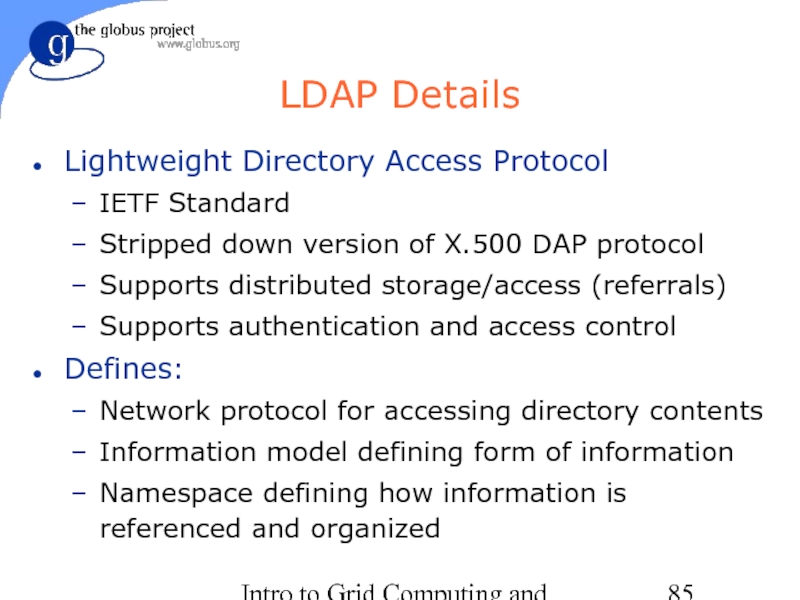
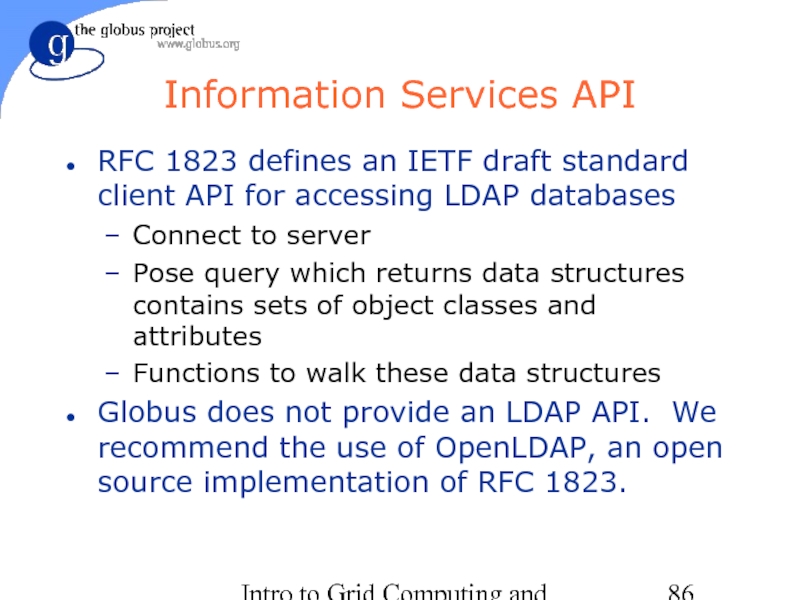
![Intro to Grid Computing and Globus Toolkit™Searching an LDAP Directorygrid-info-search [options] filter [attributes]Default grid-info-search options-h](/img/tmb/3/225636/666cadc69204e8256ef282410317993b-800x.jpg)
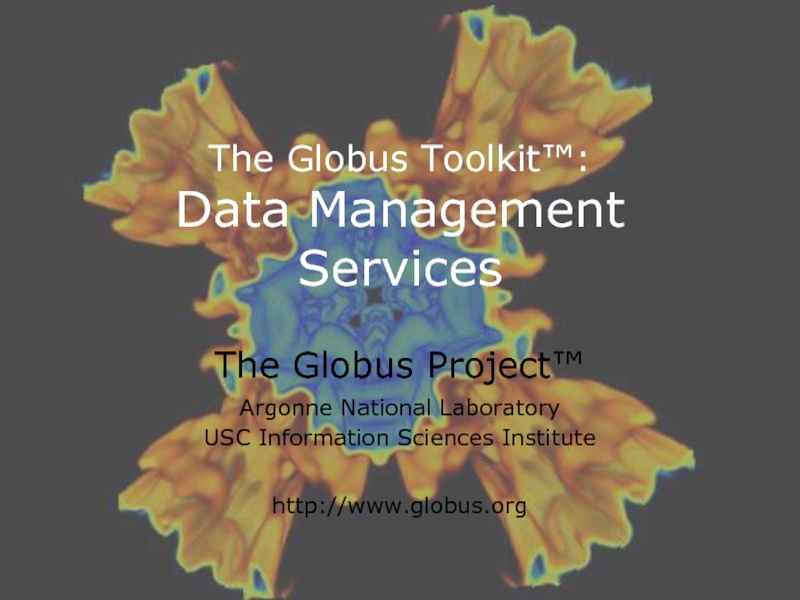
![Intro to Grid Computing and Globus Toolkit™Data Grid Problem“Enable a geographically distributed community [of thousands]](/img/tmb/3/225636/fa82a1294e08a2064ab851cf7c87c2be-800x.jpg)
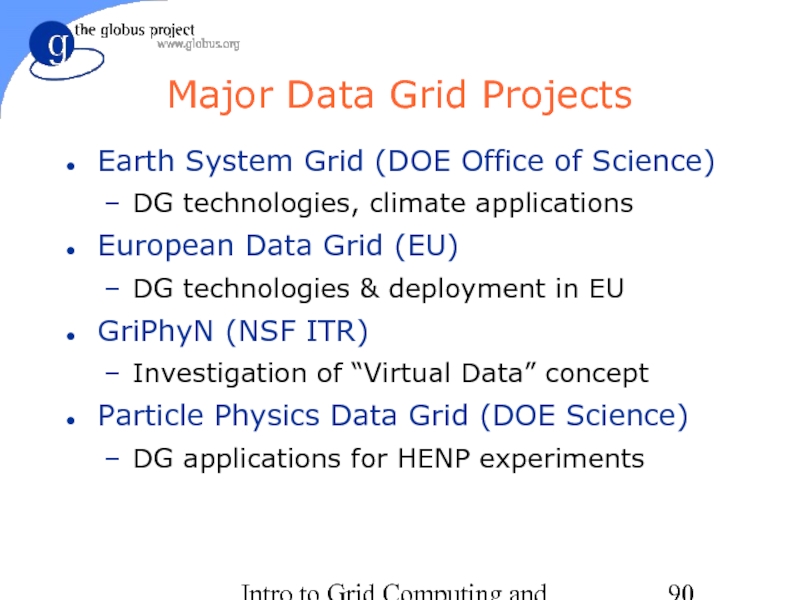
![Intro to Grid Computing and Globus Toolkit™Data Intensive Issues Include …Harness [potentially large numbers of]](/img/tmb/3/225636/371037f2b3e8362d93861da8f876d91f-800x.jpg)
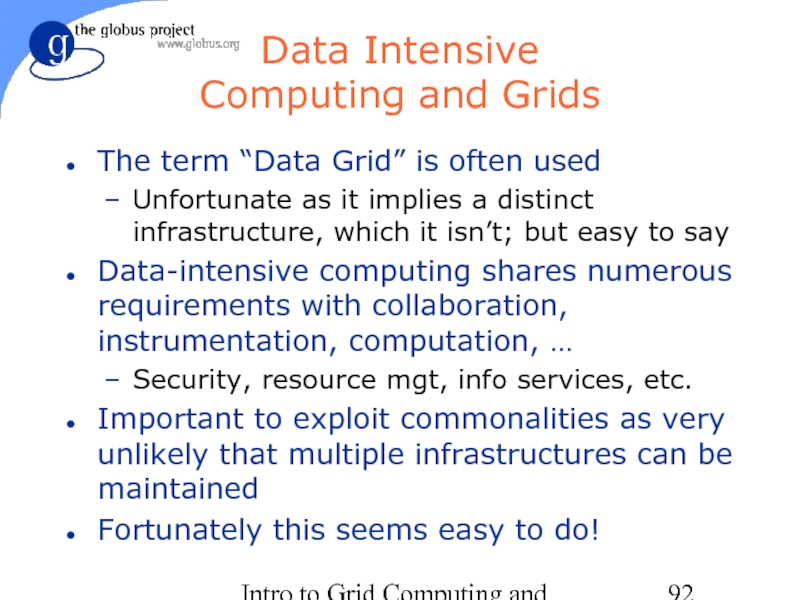
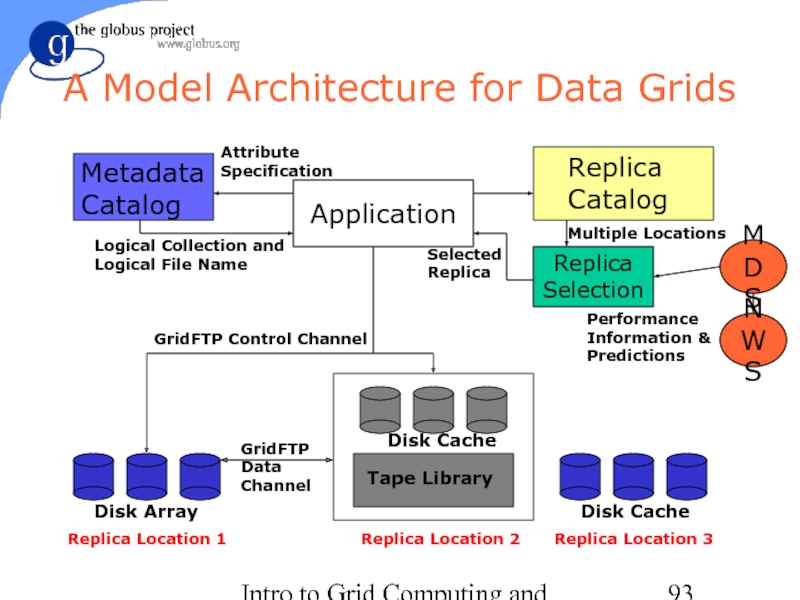
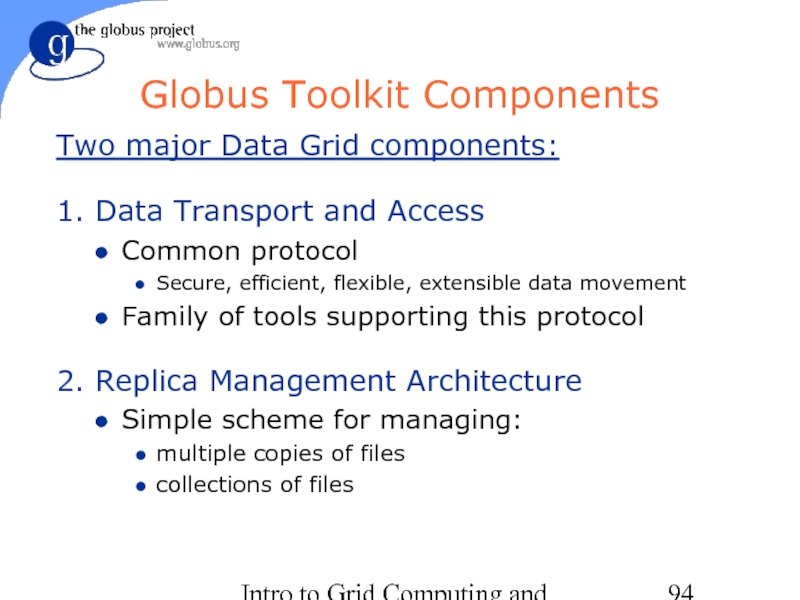
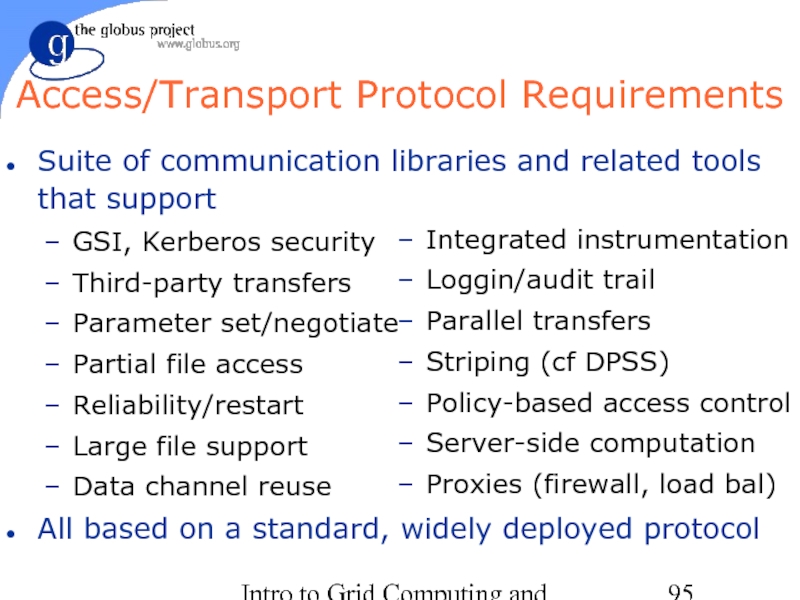
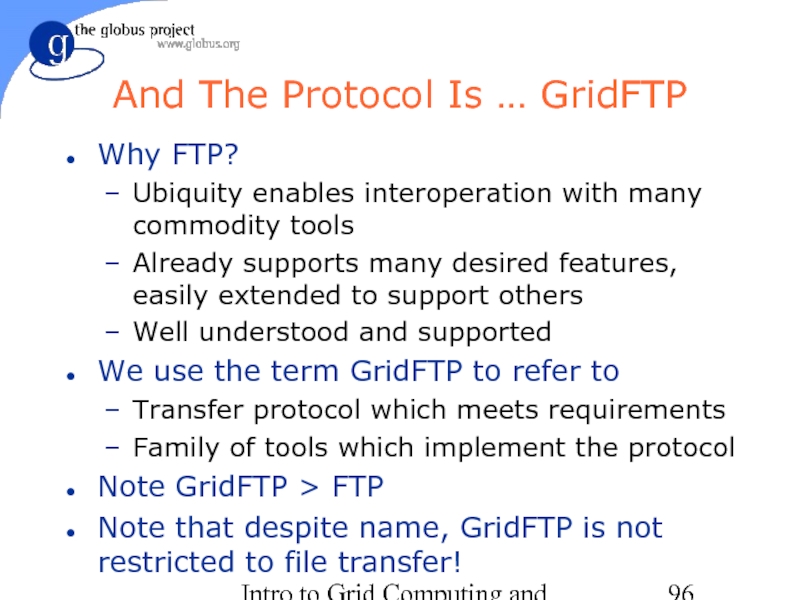
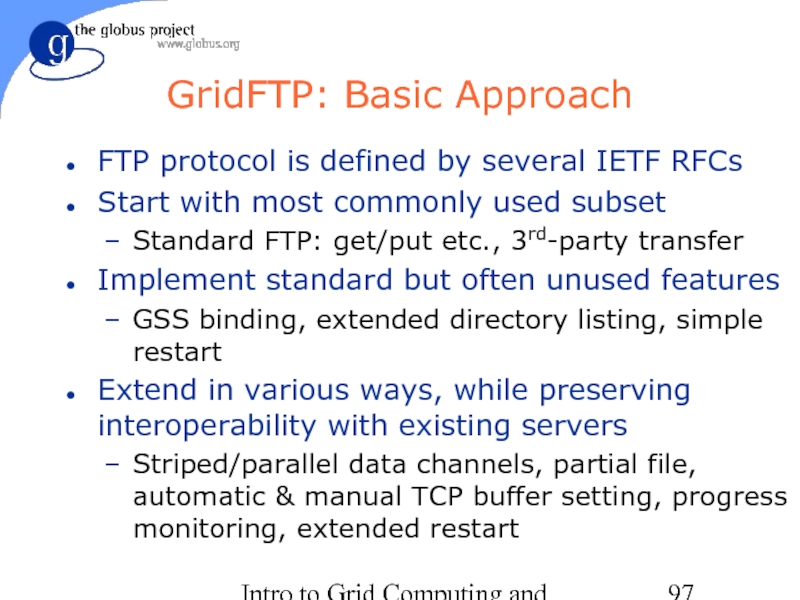
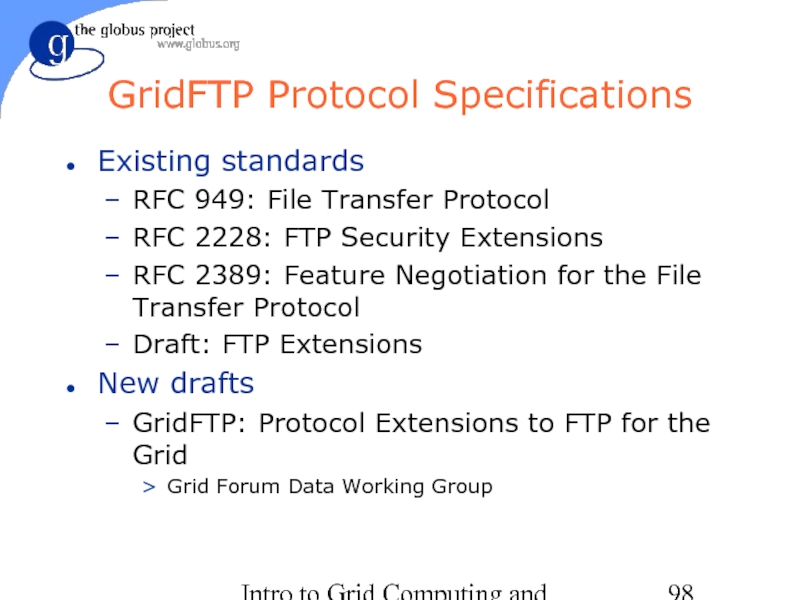
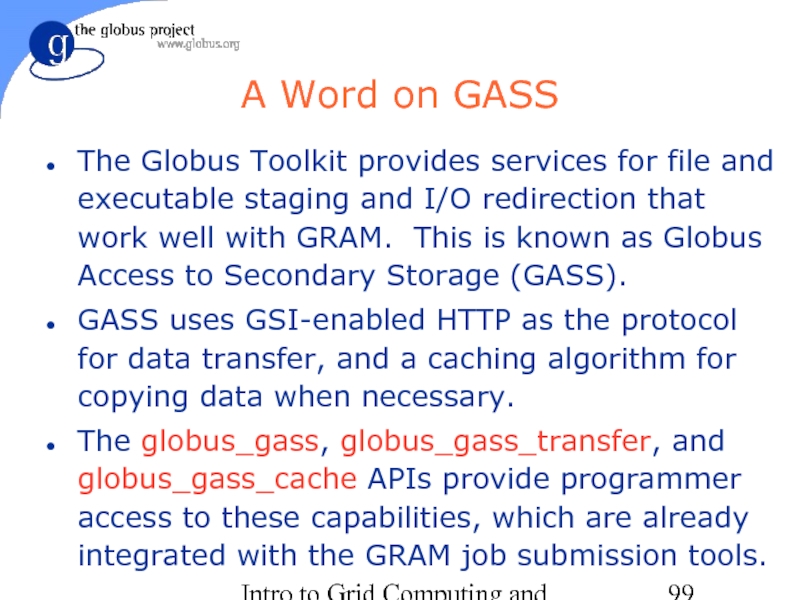
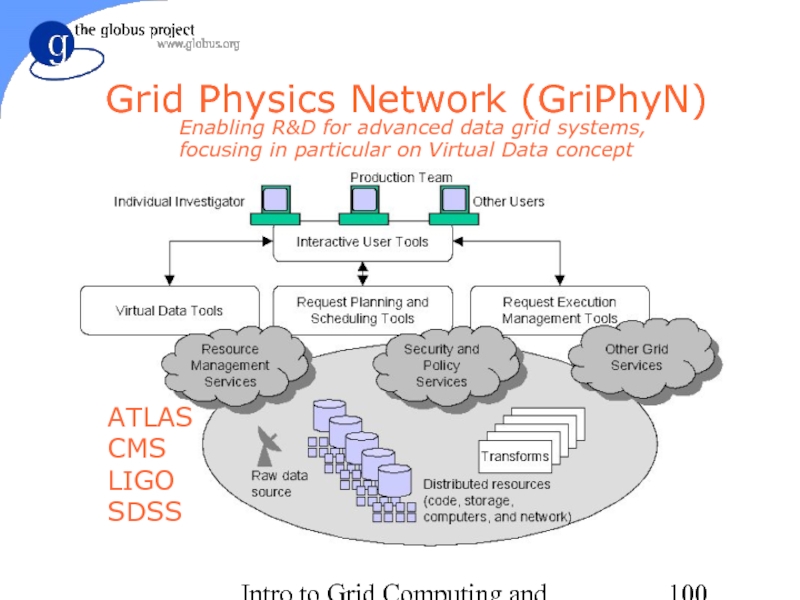
![Intro to Grid Computing and Globus Toolkit™The Virtual Data Concept “[a virtual data grid enables]](/img/tmb/3/225636/813021a88220f882b08aa28e3bc65bed-800x.jpg)
